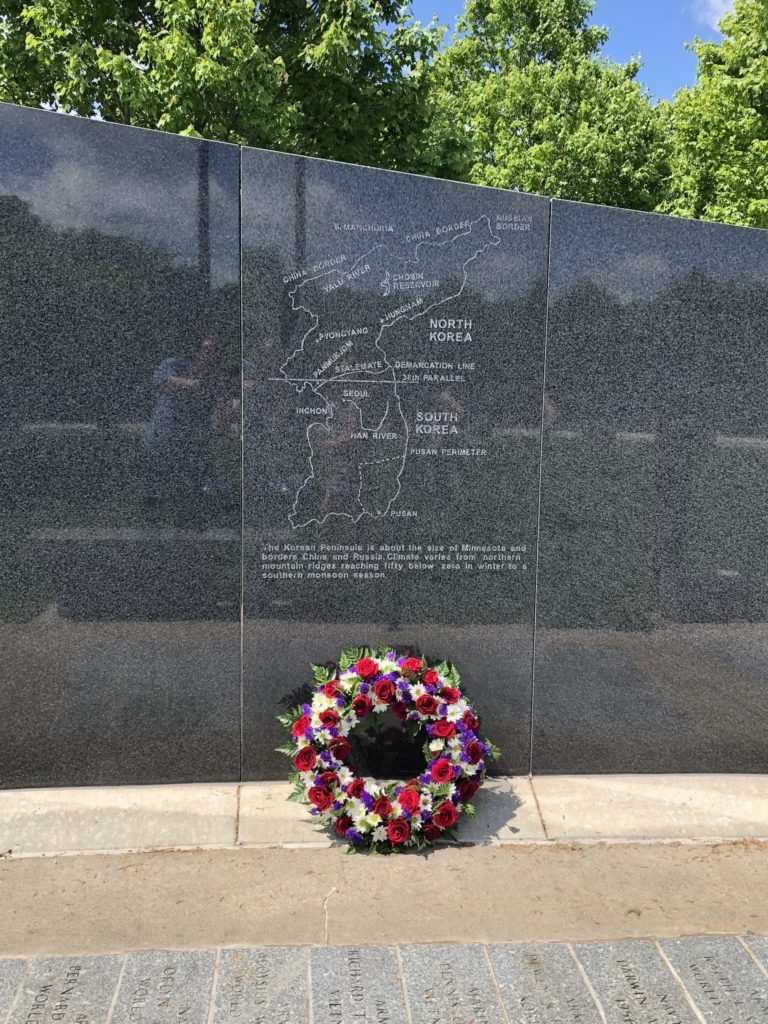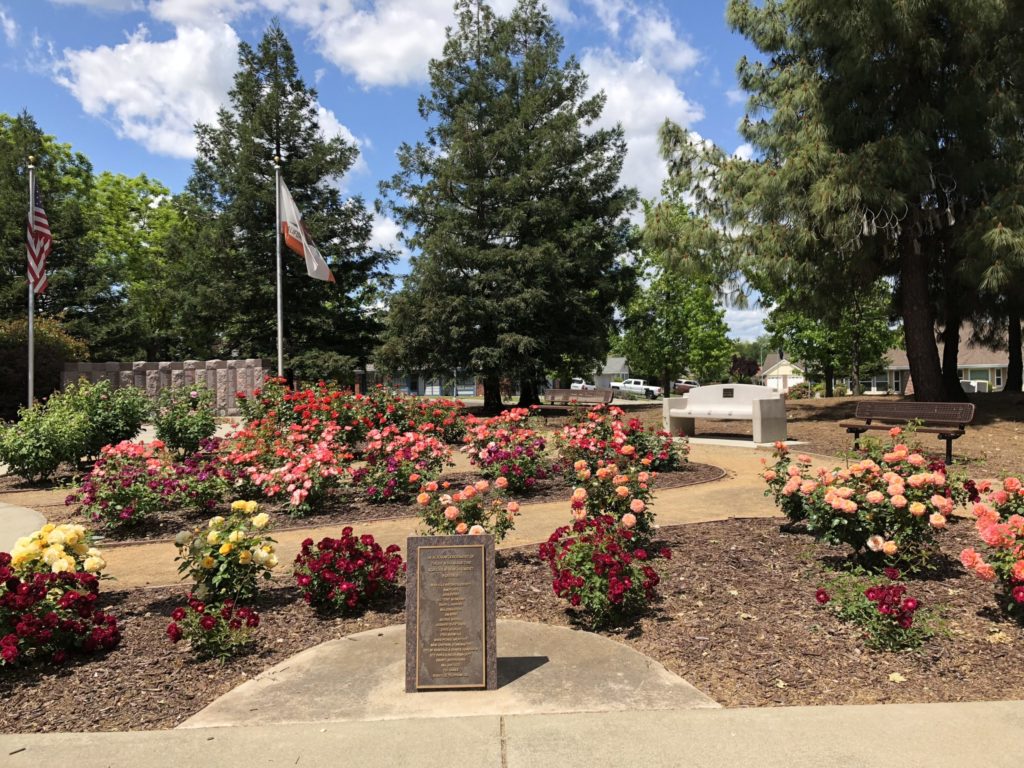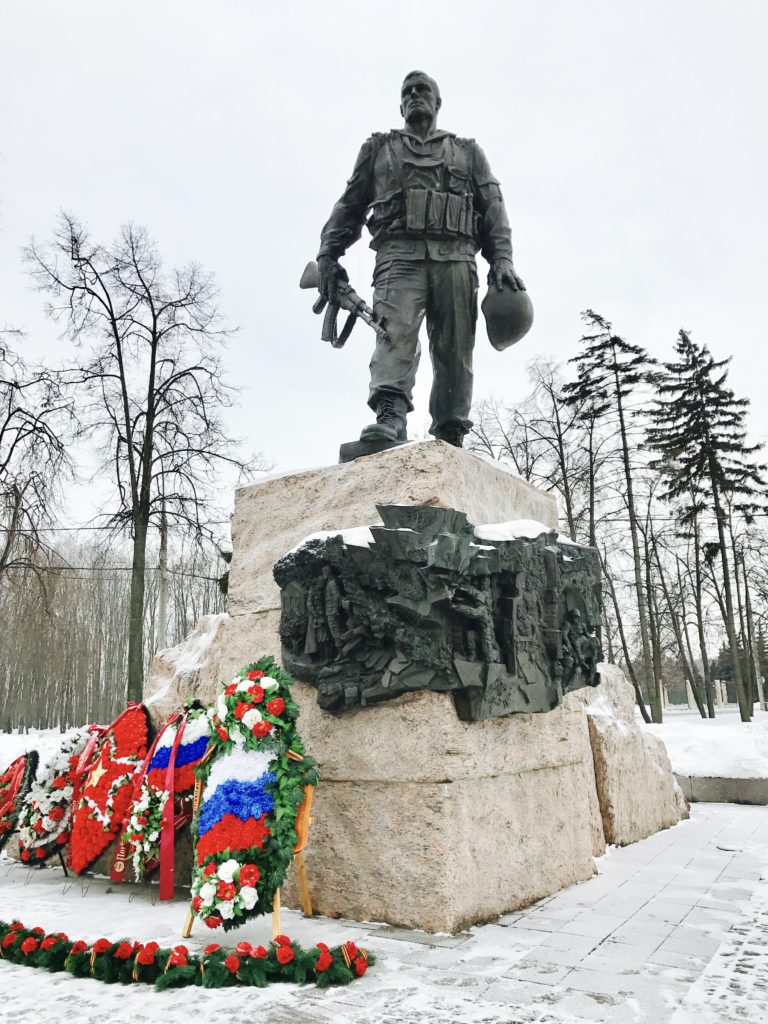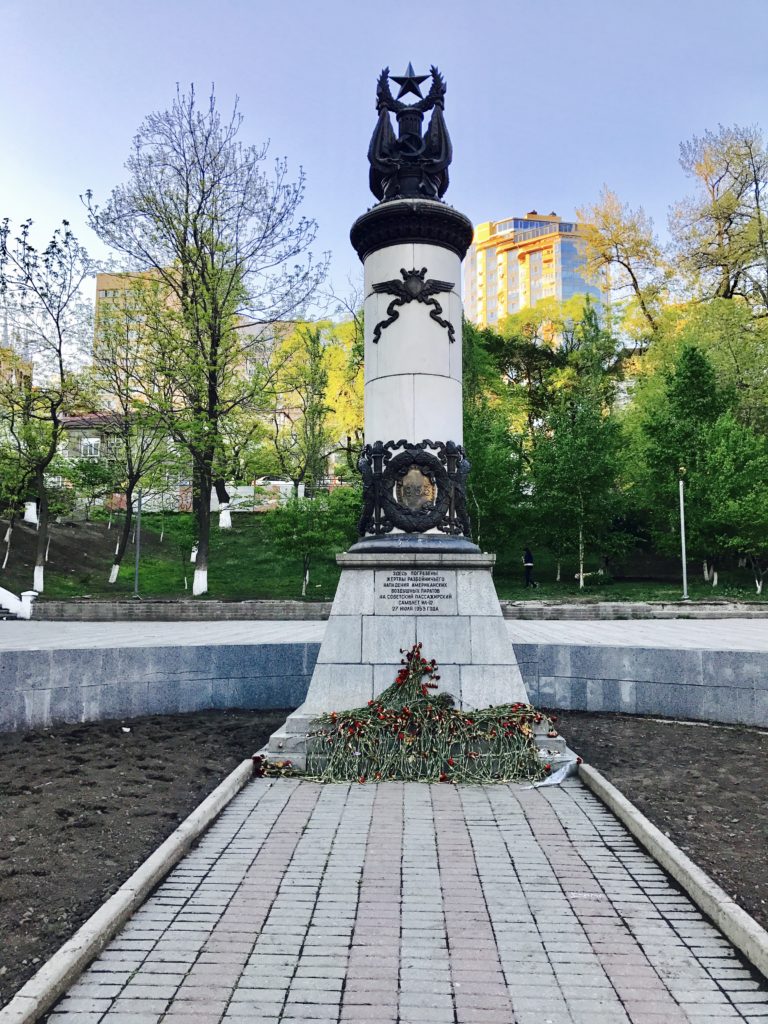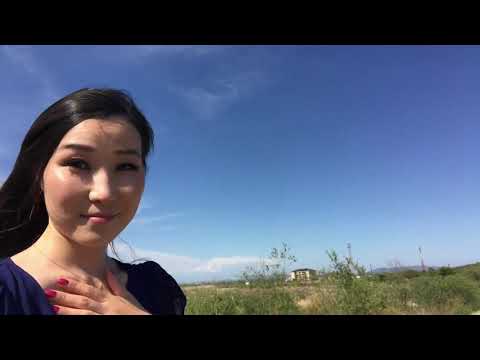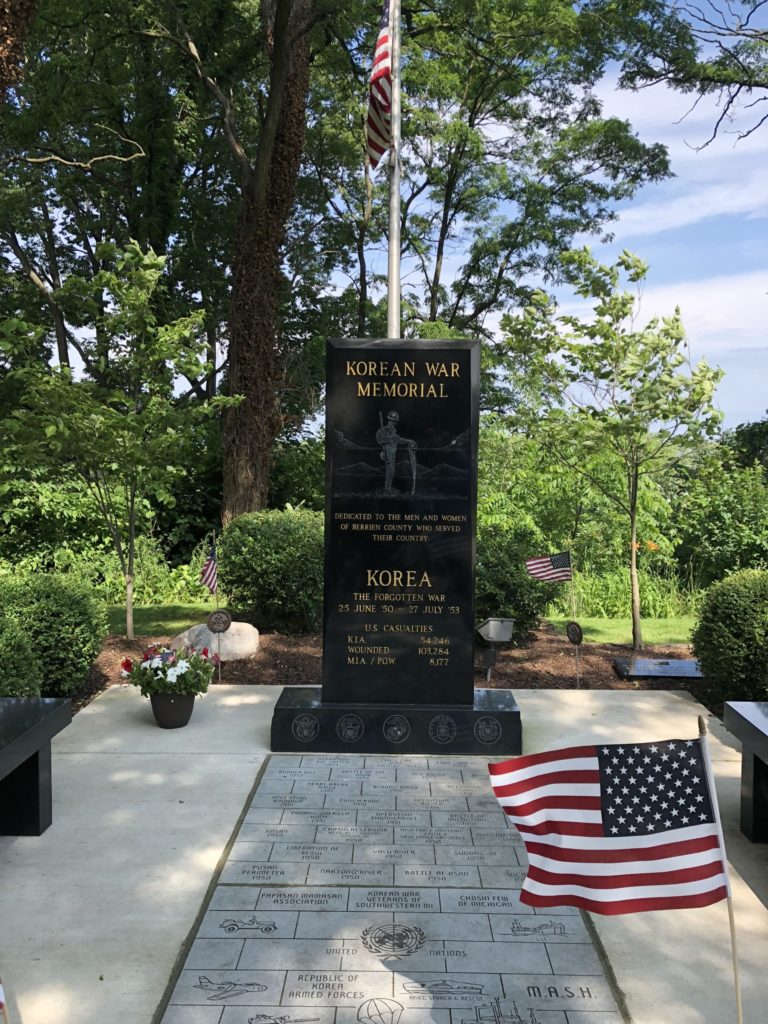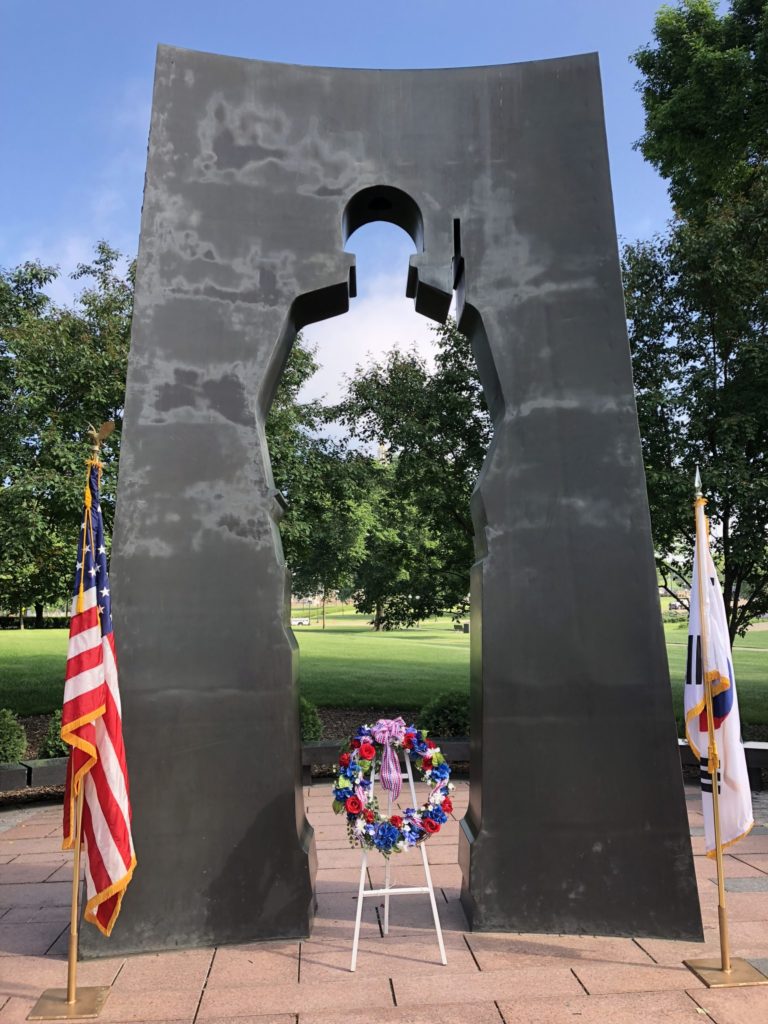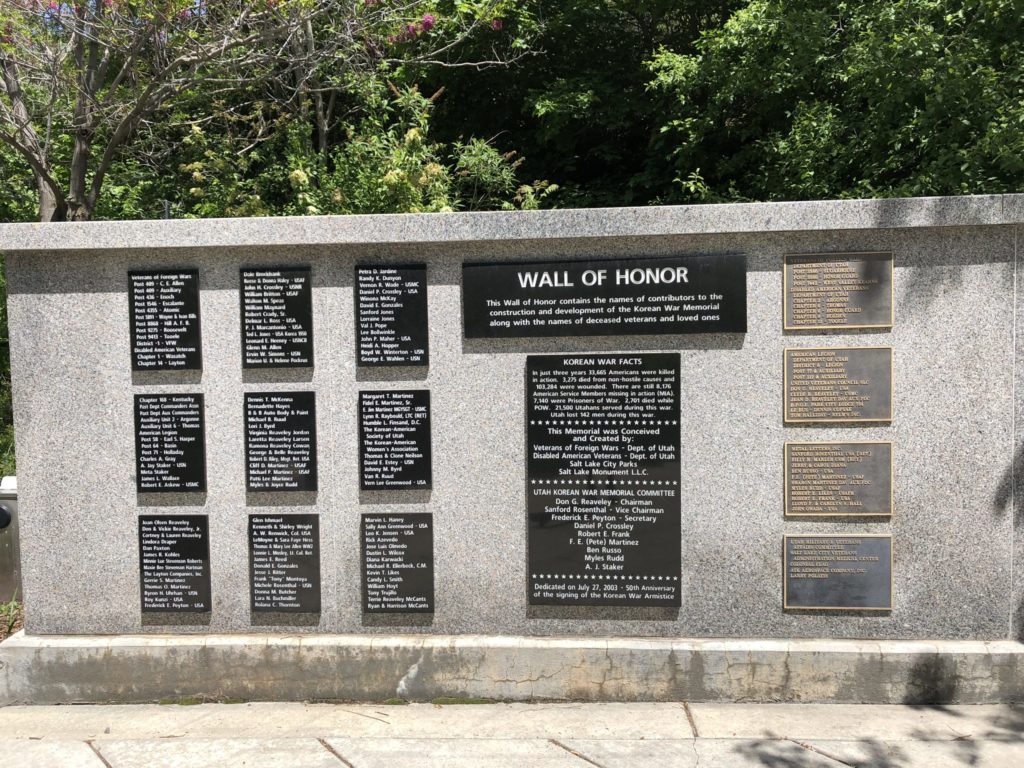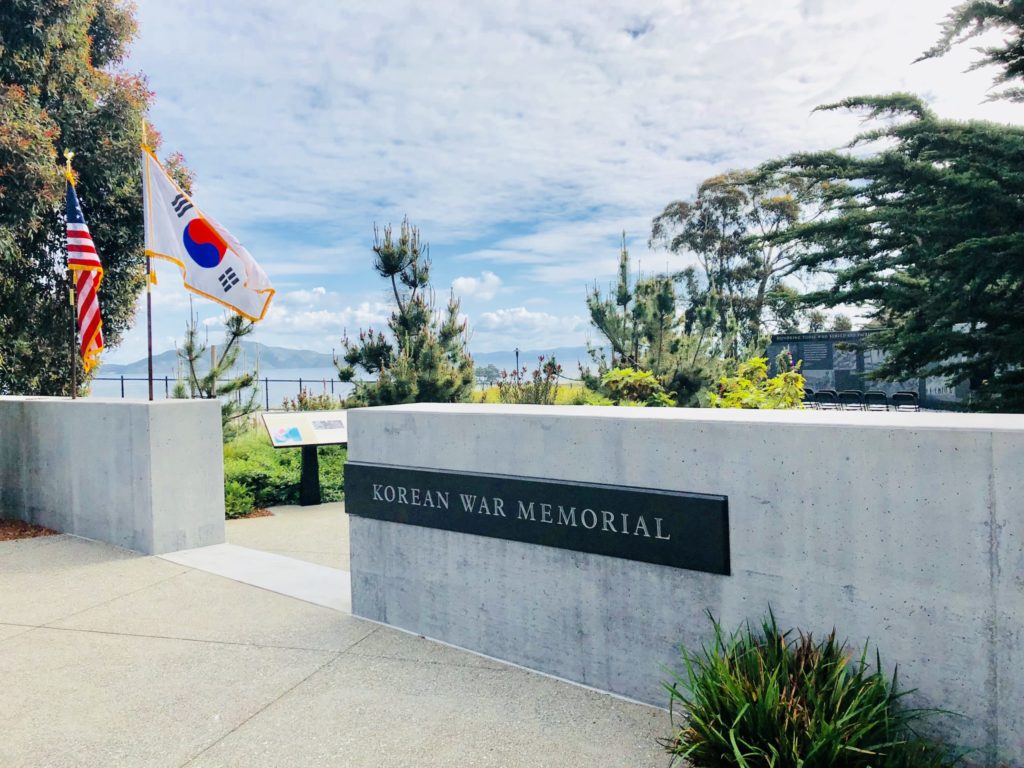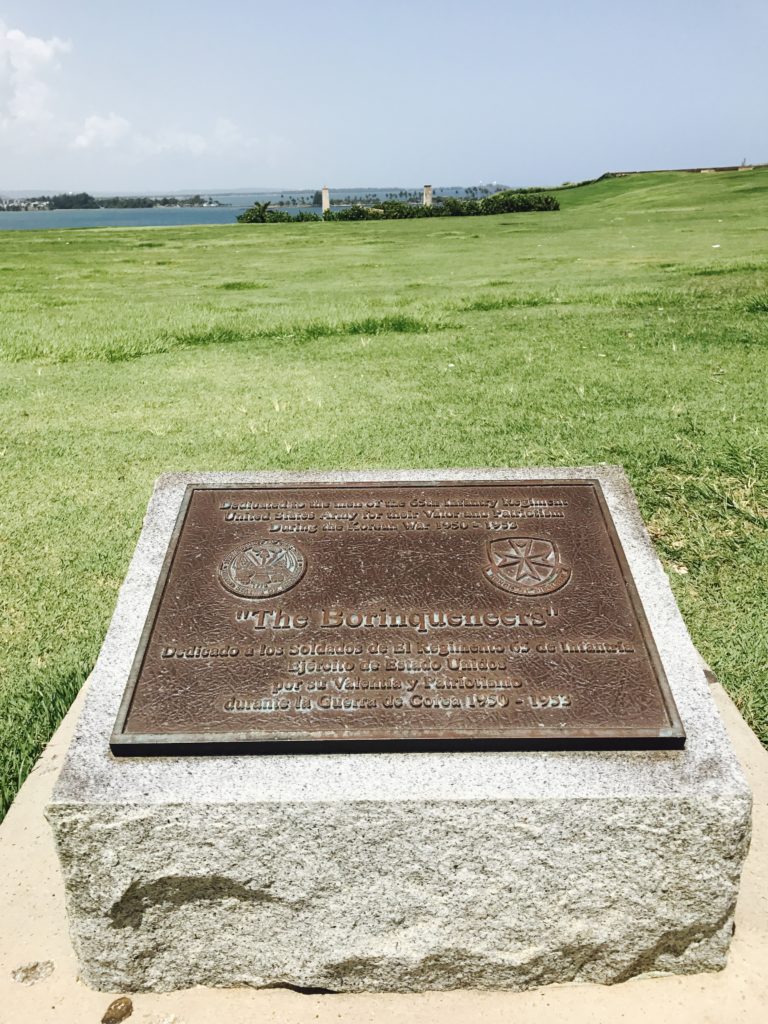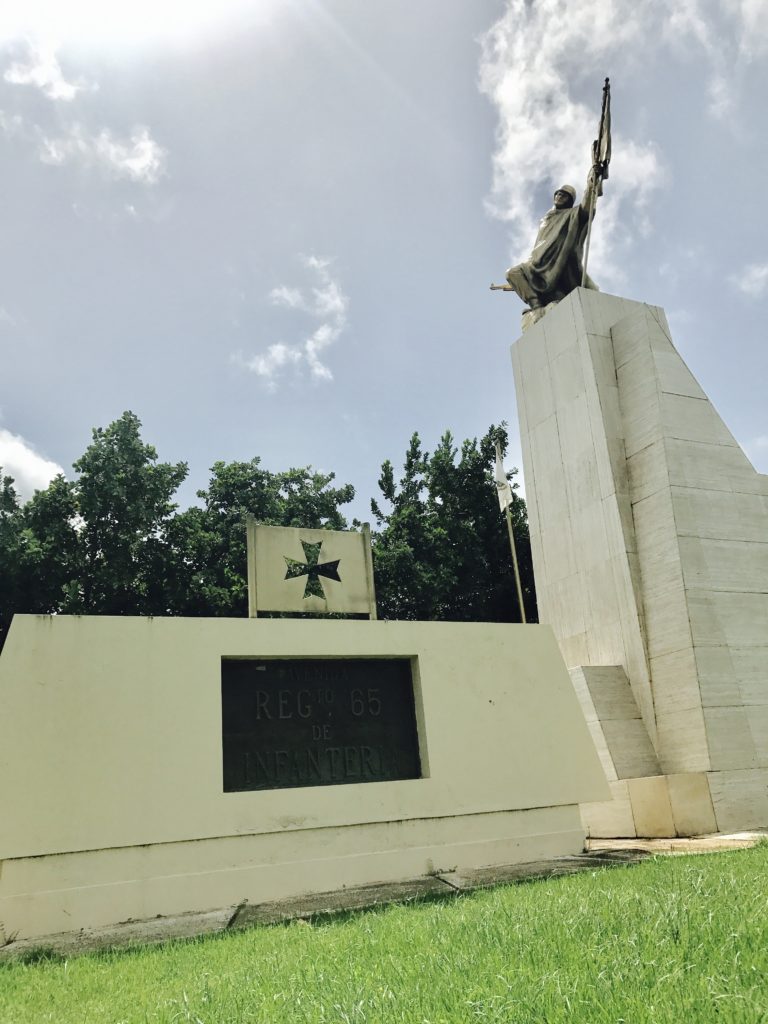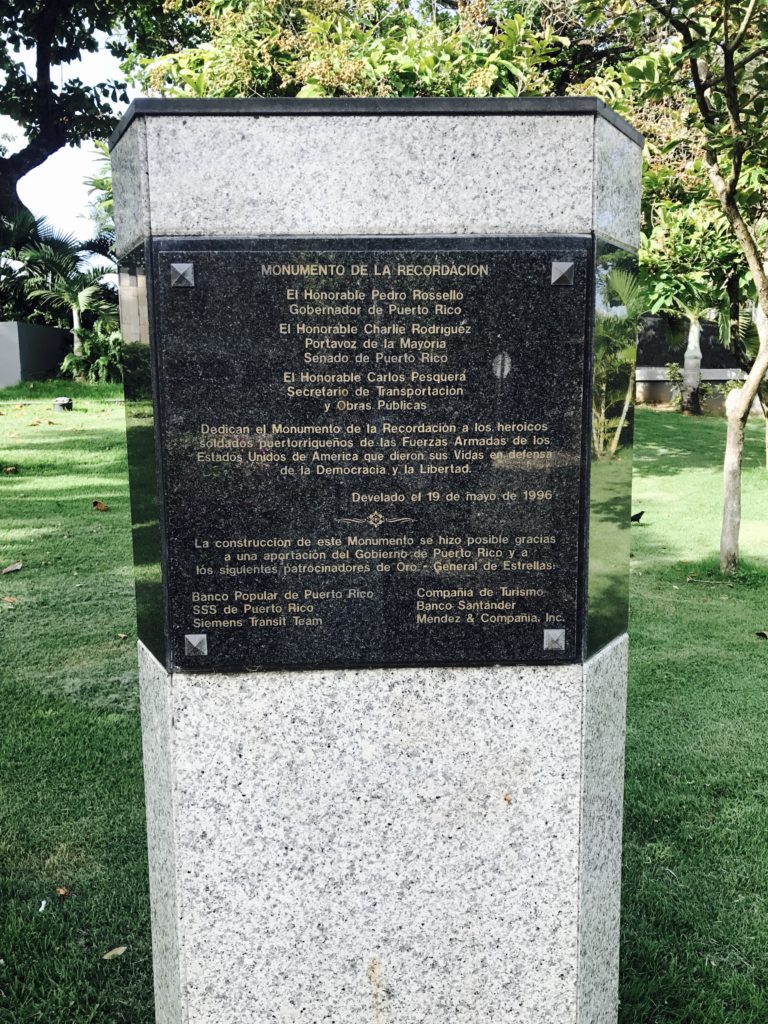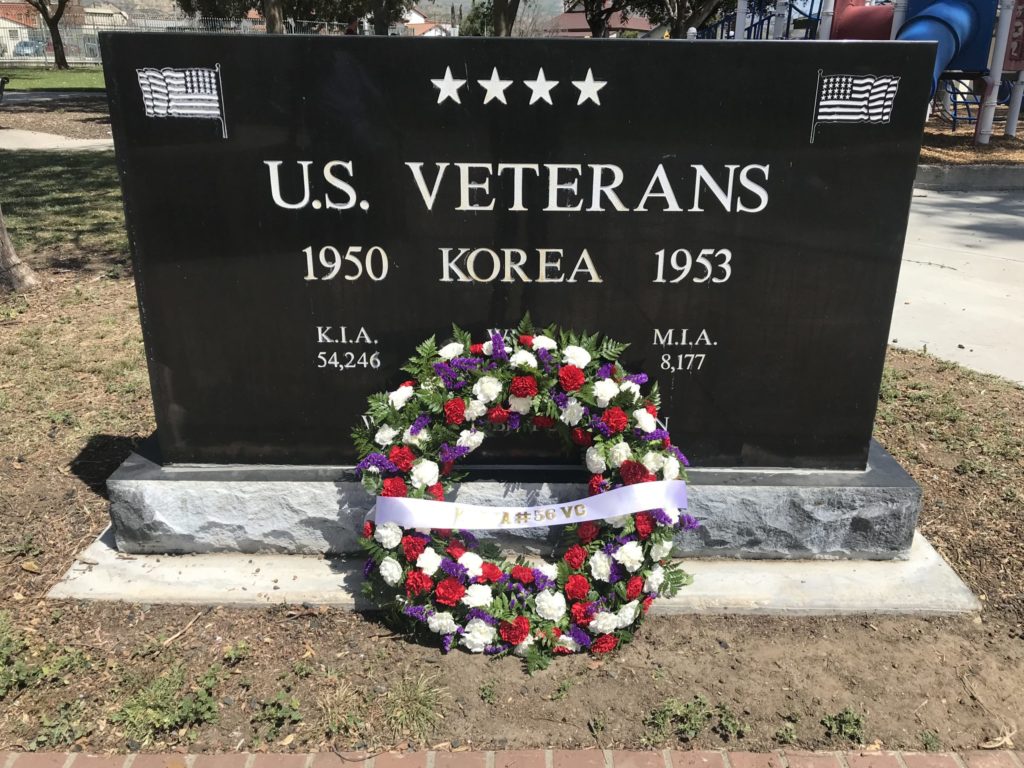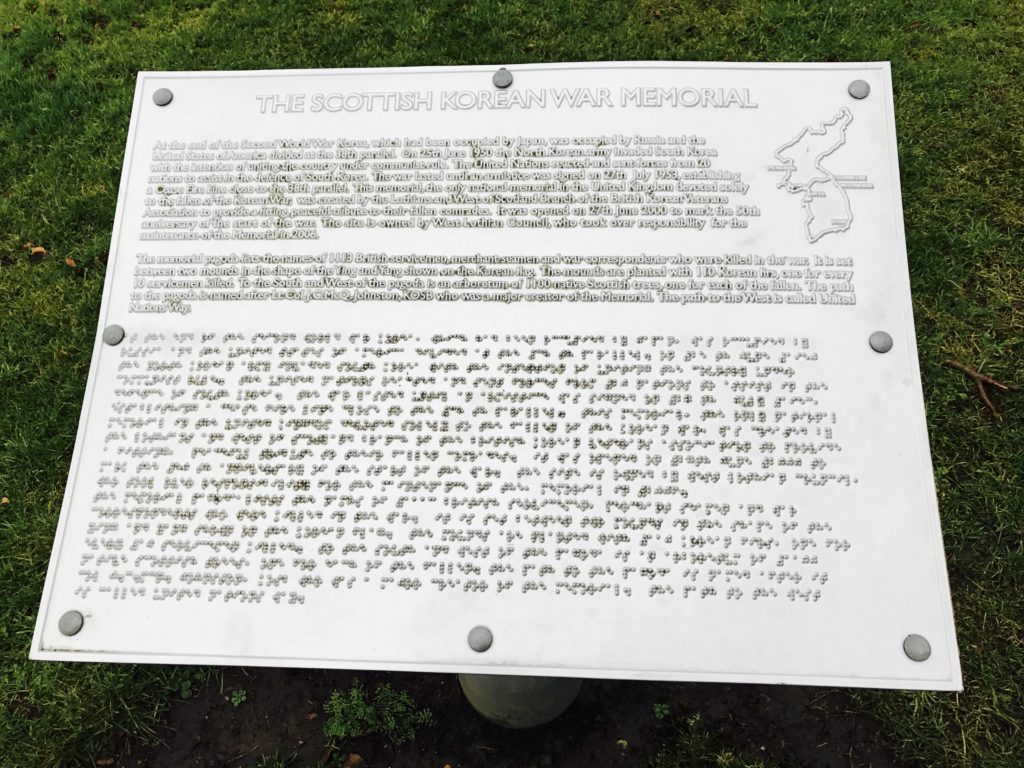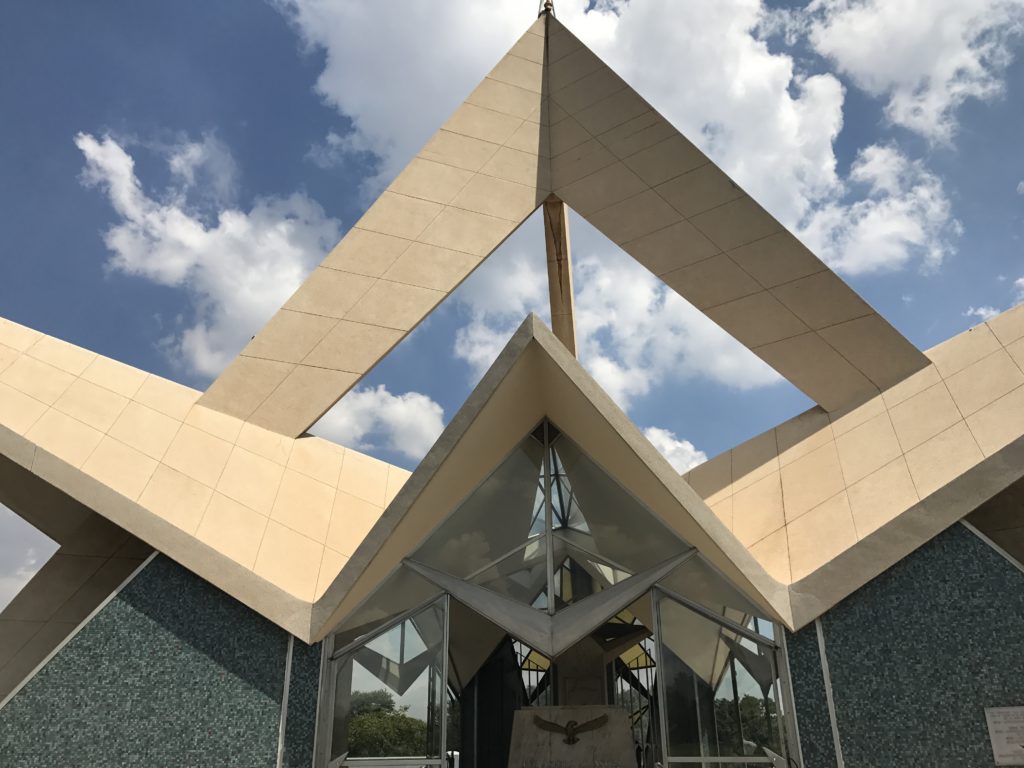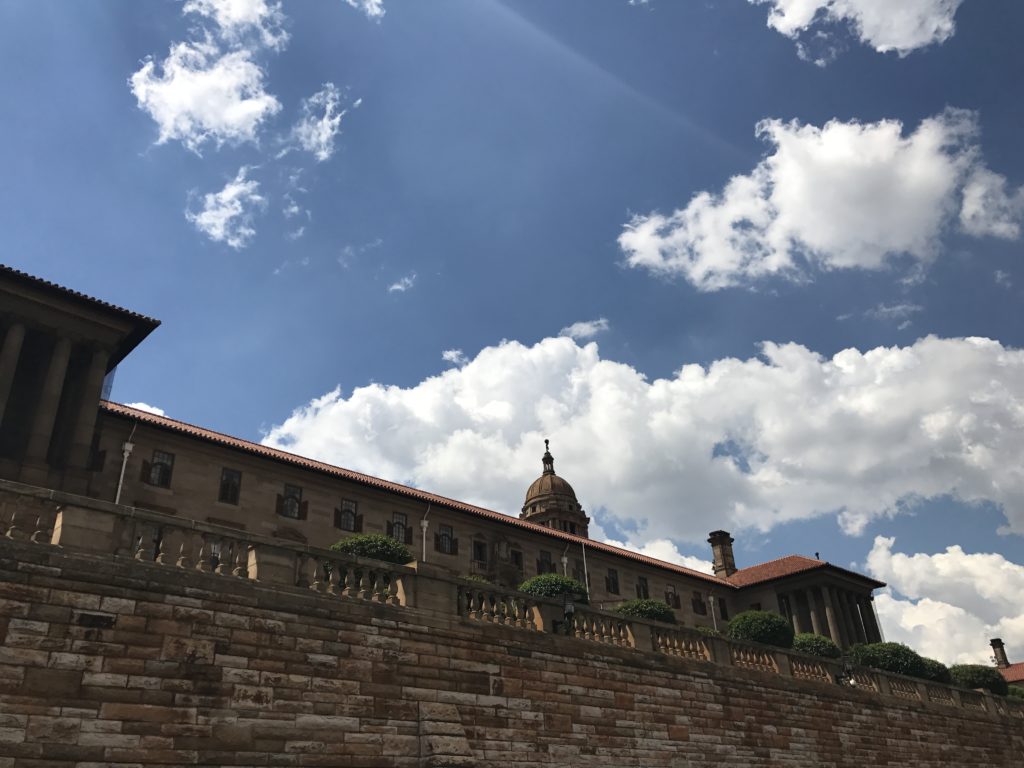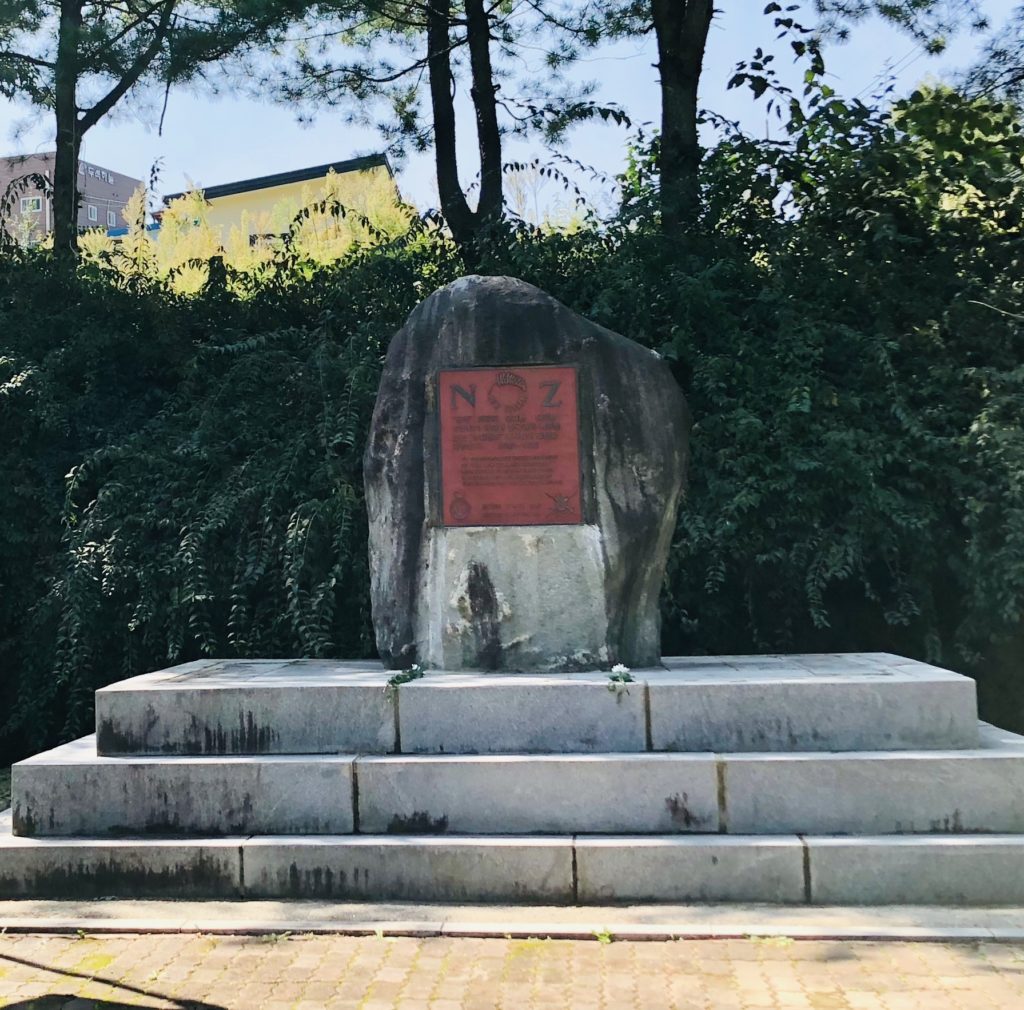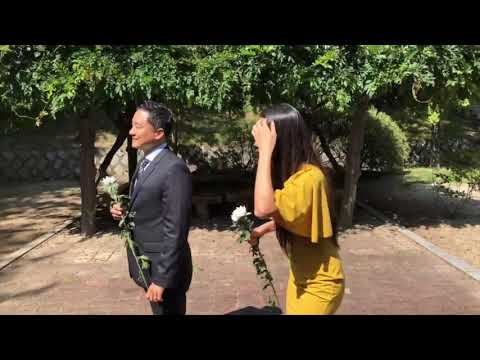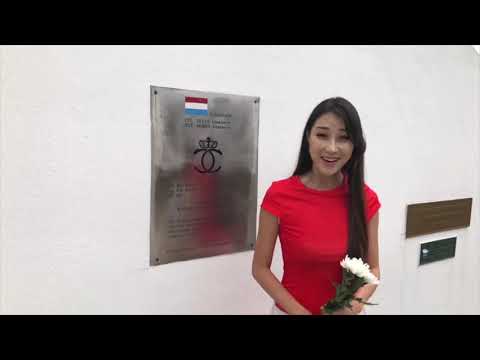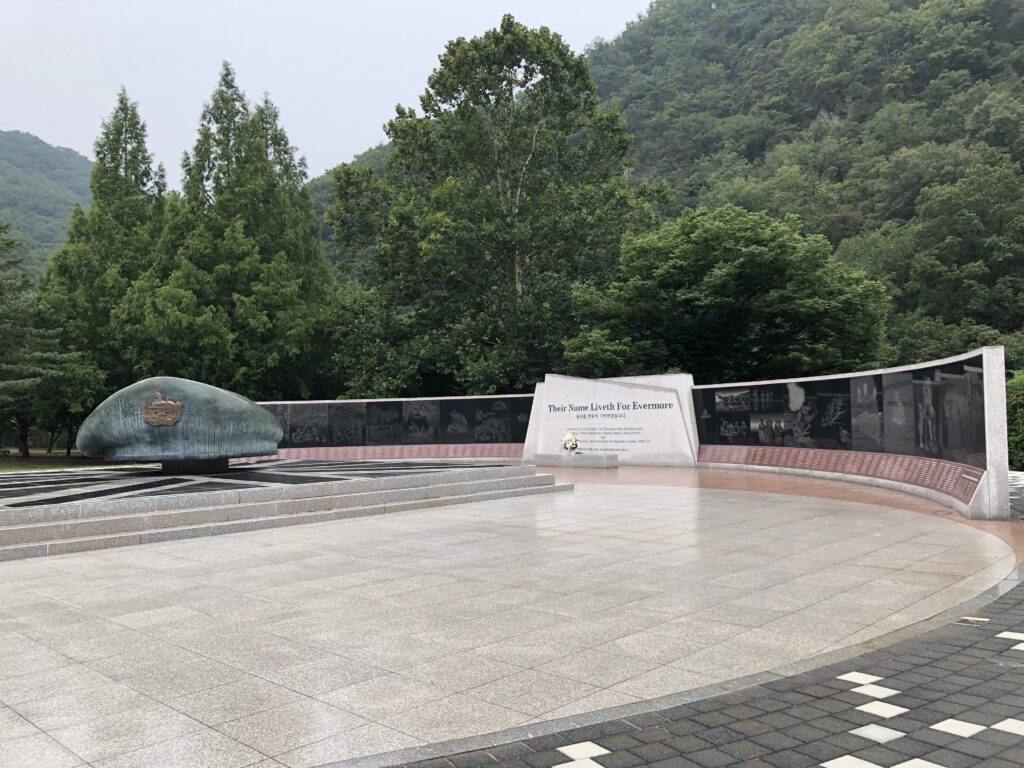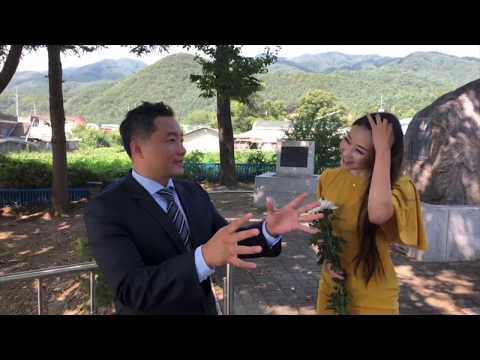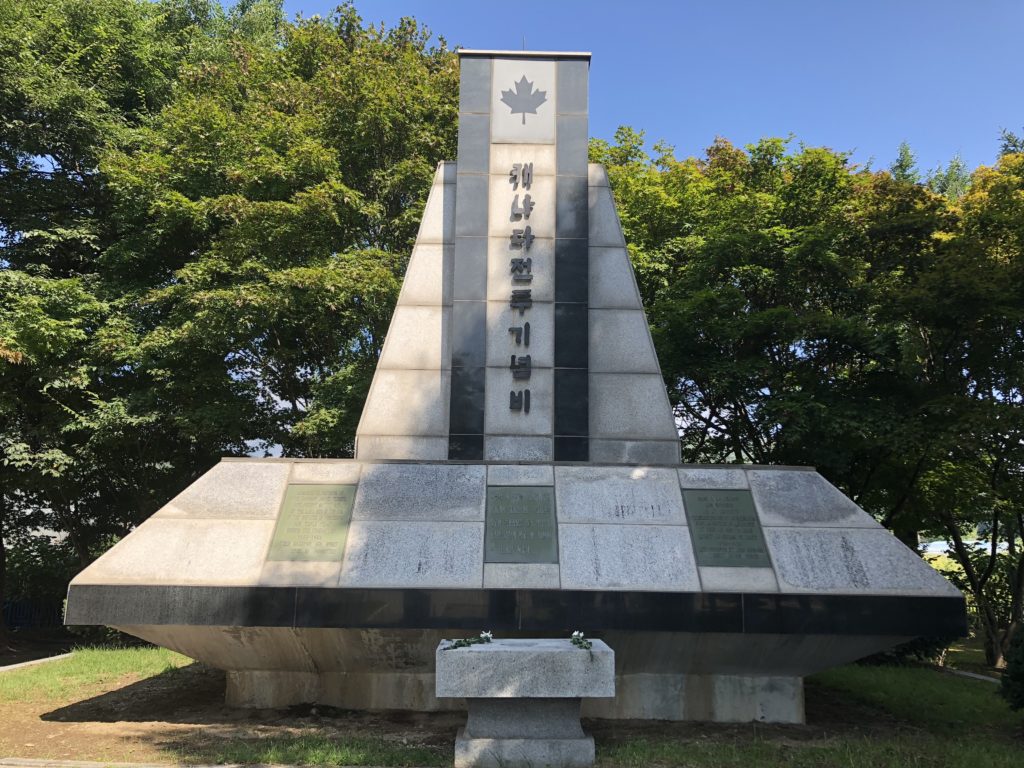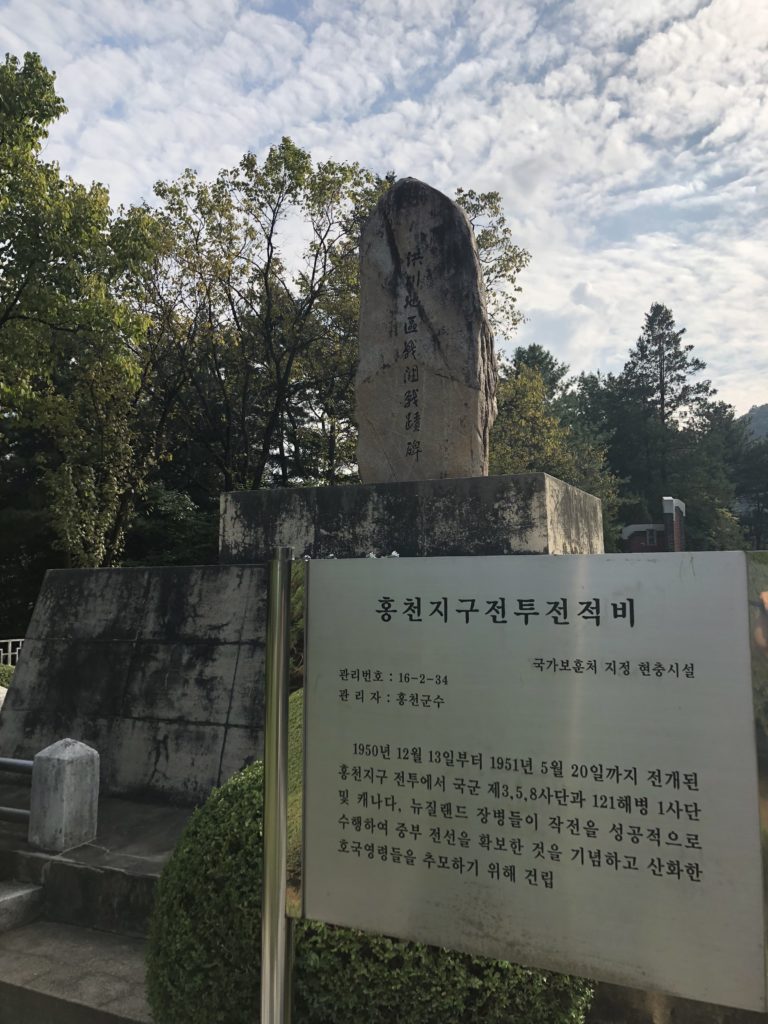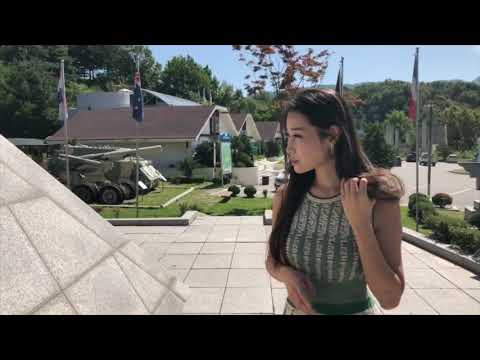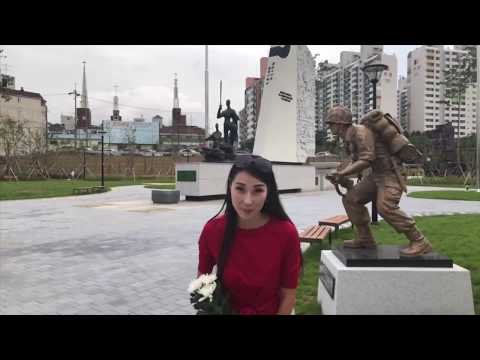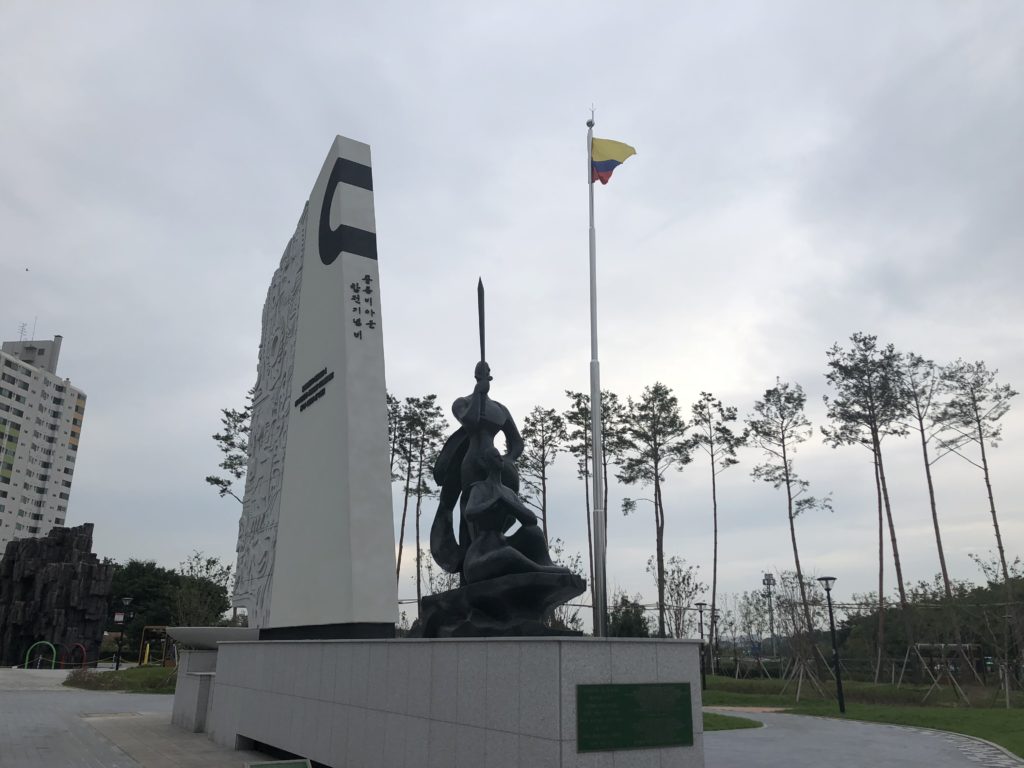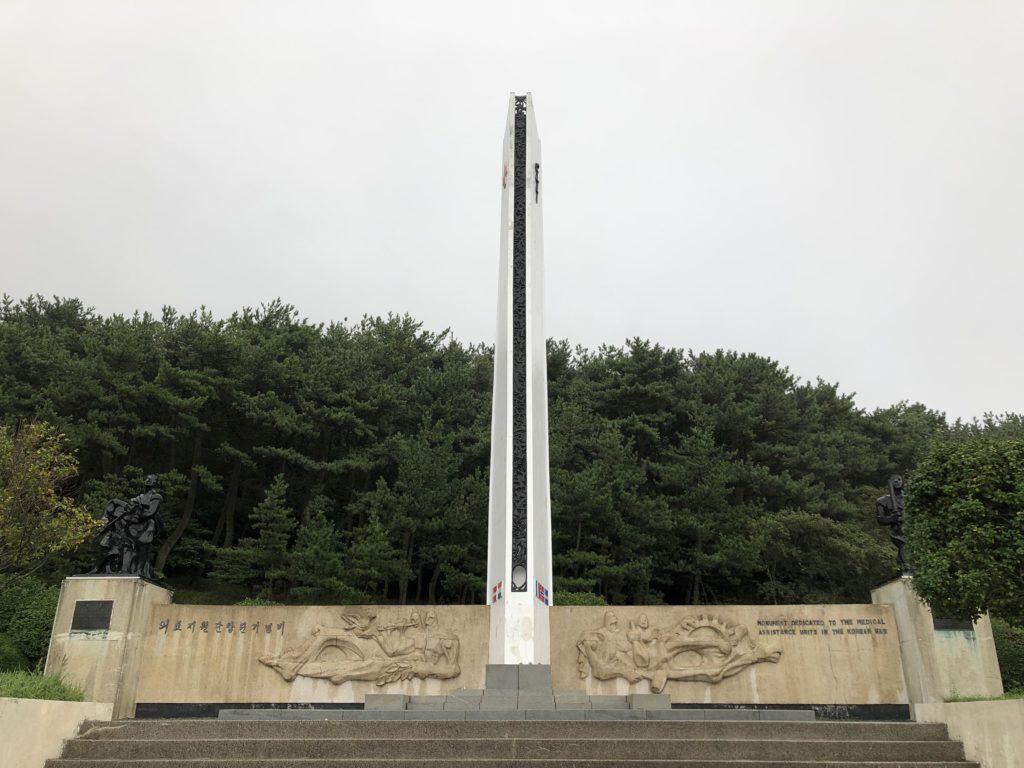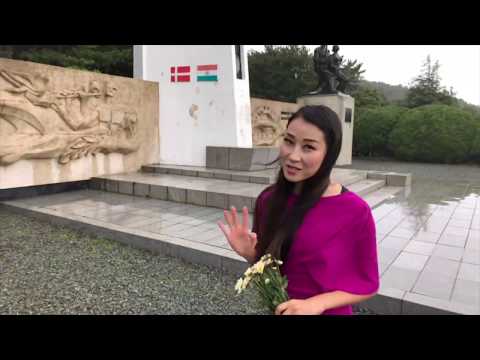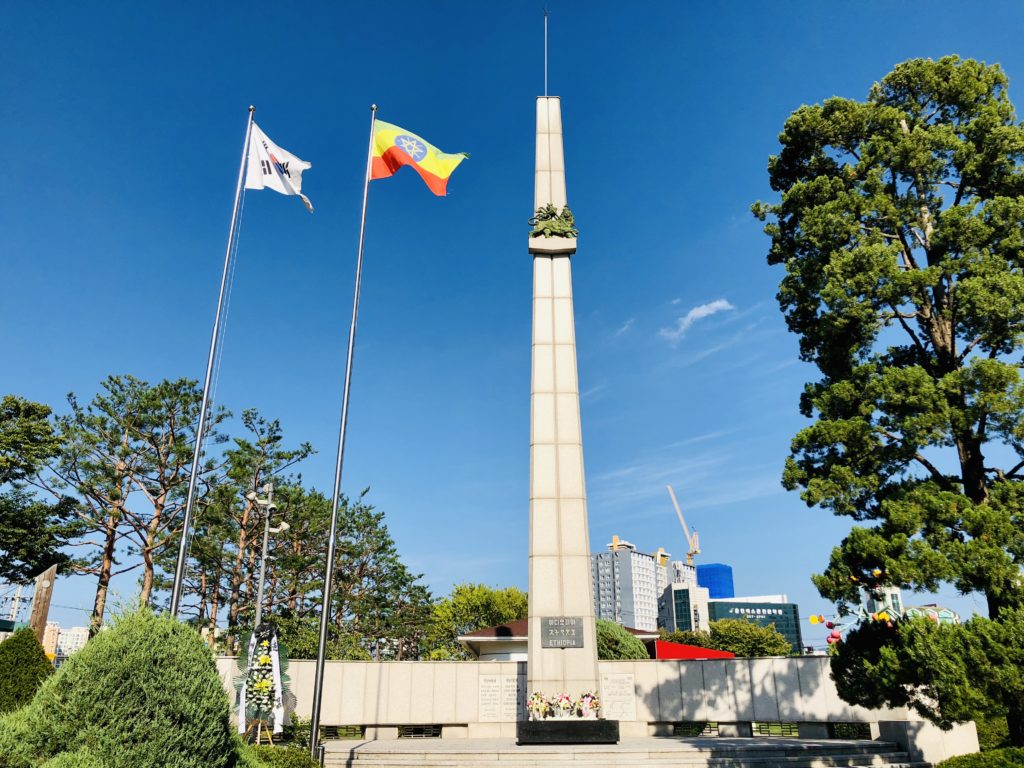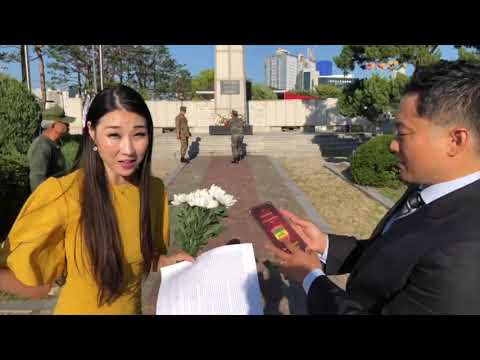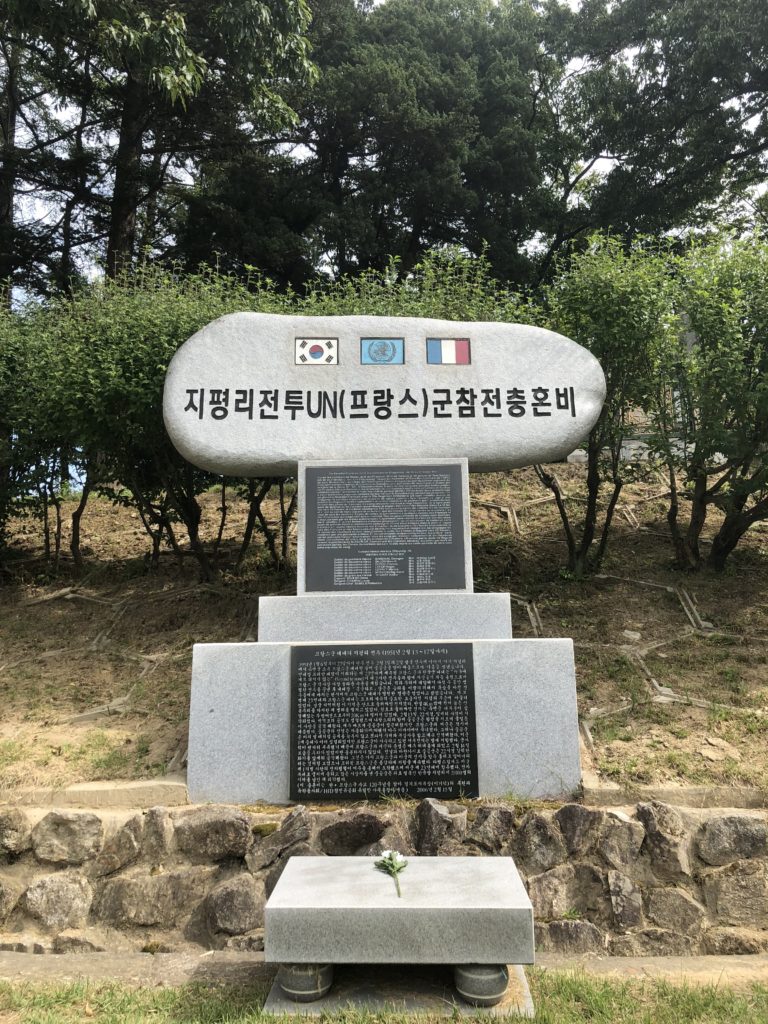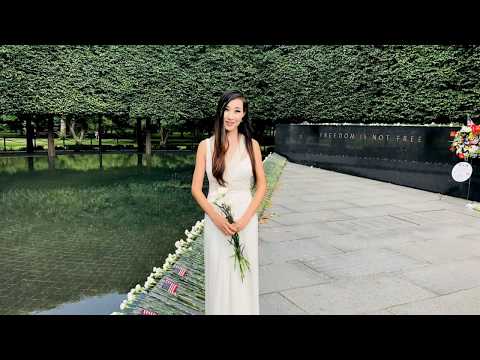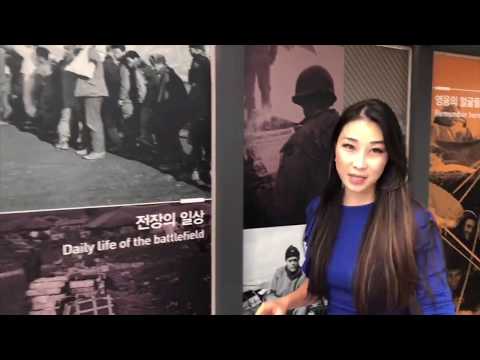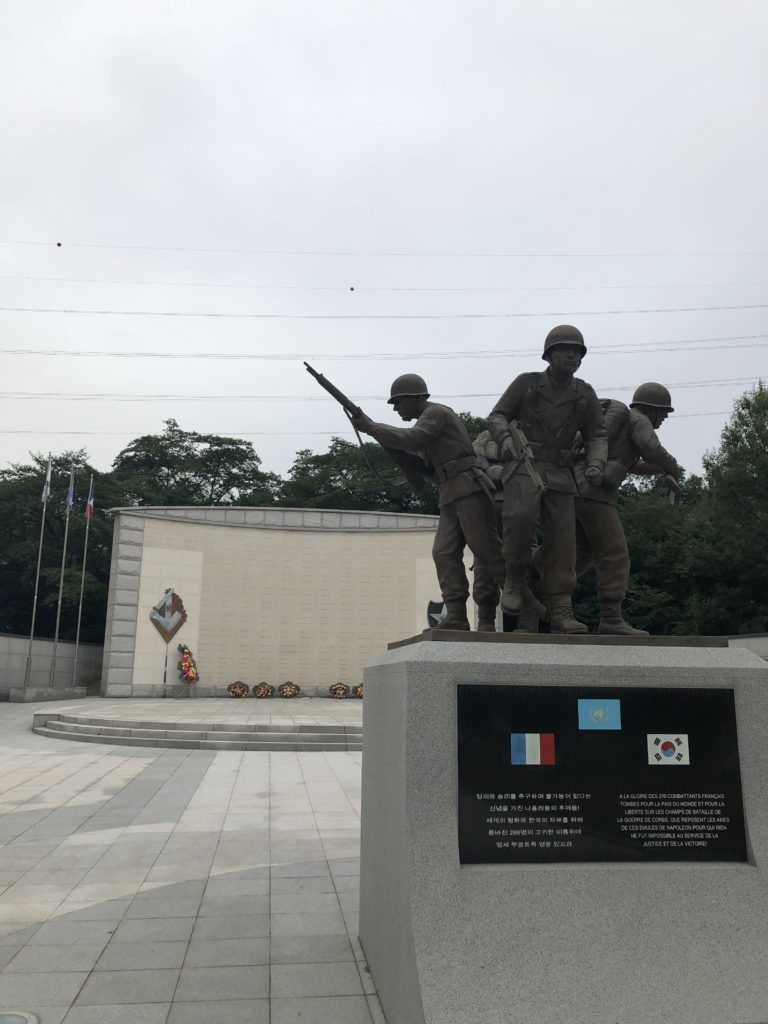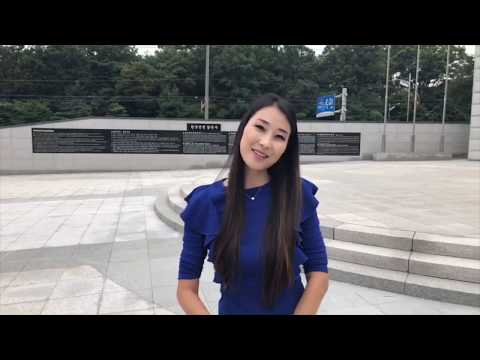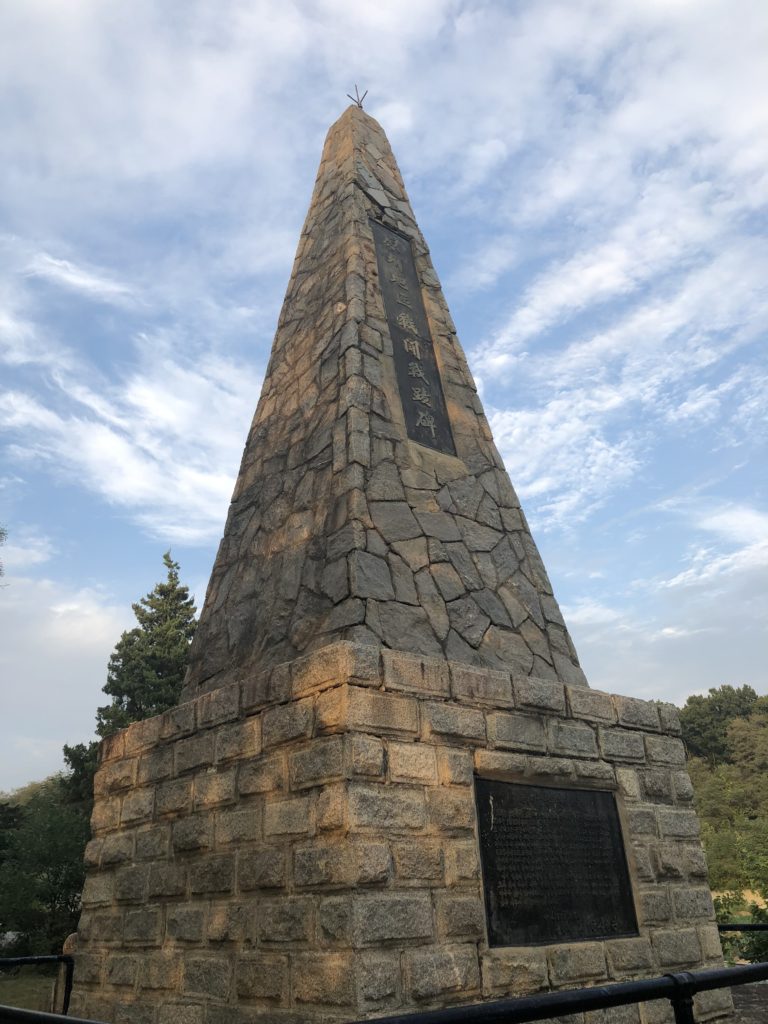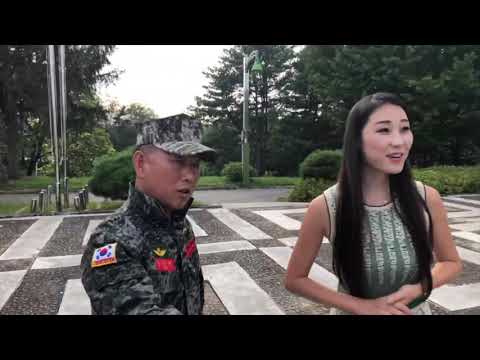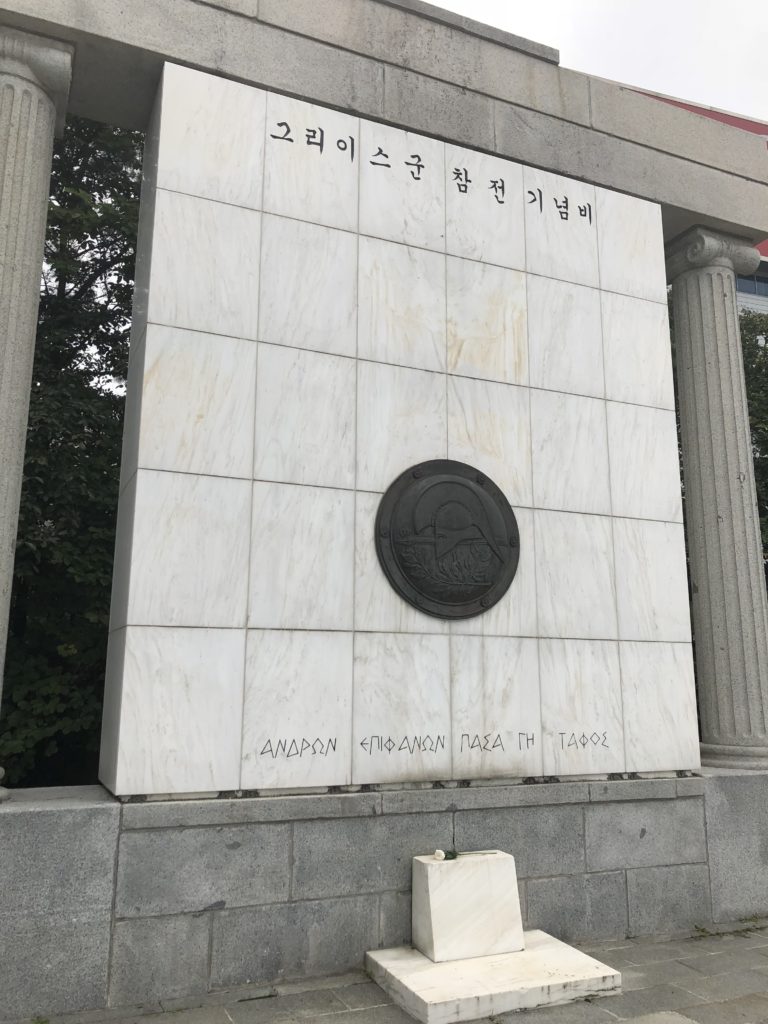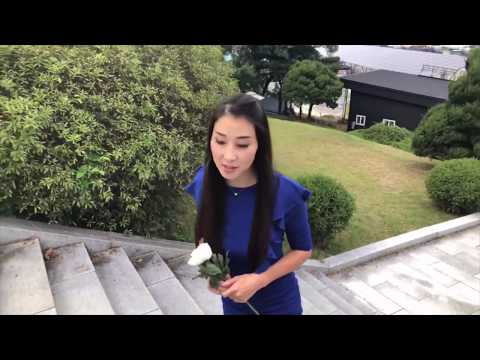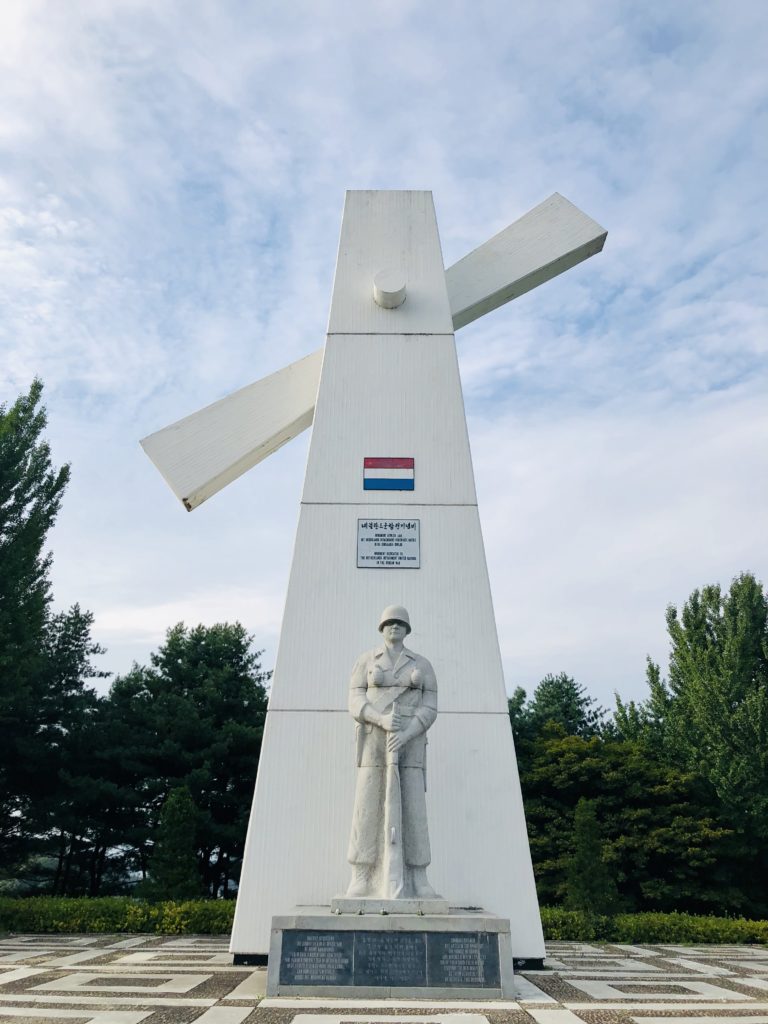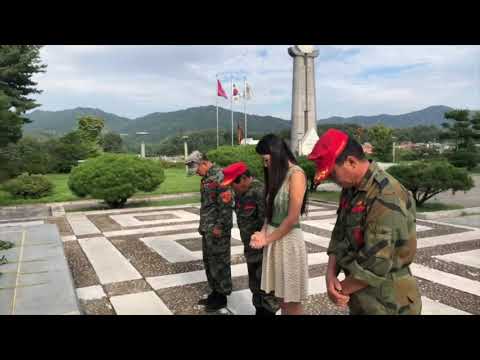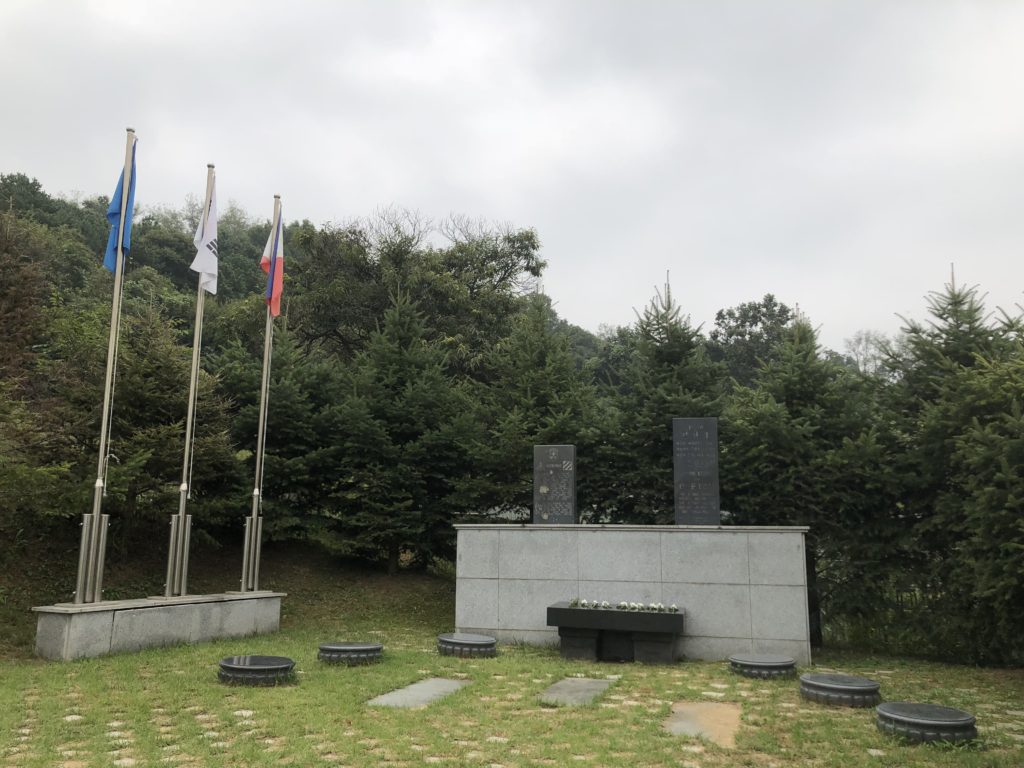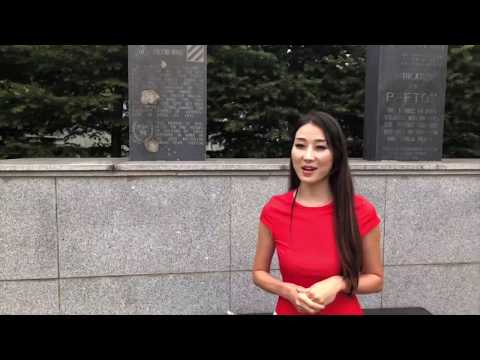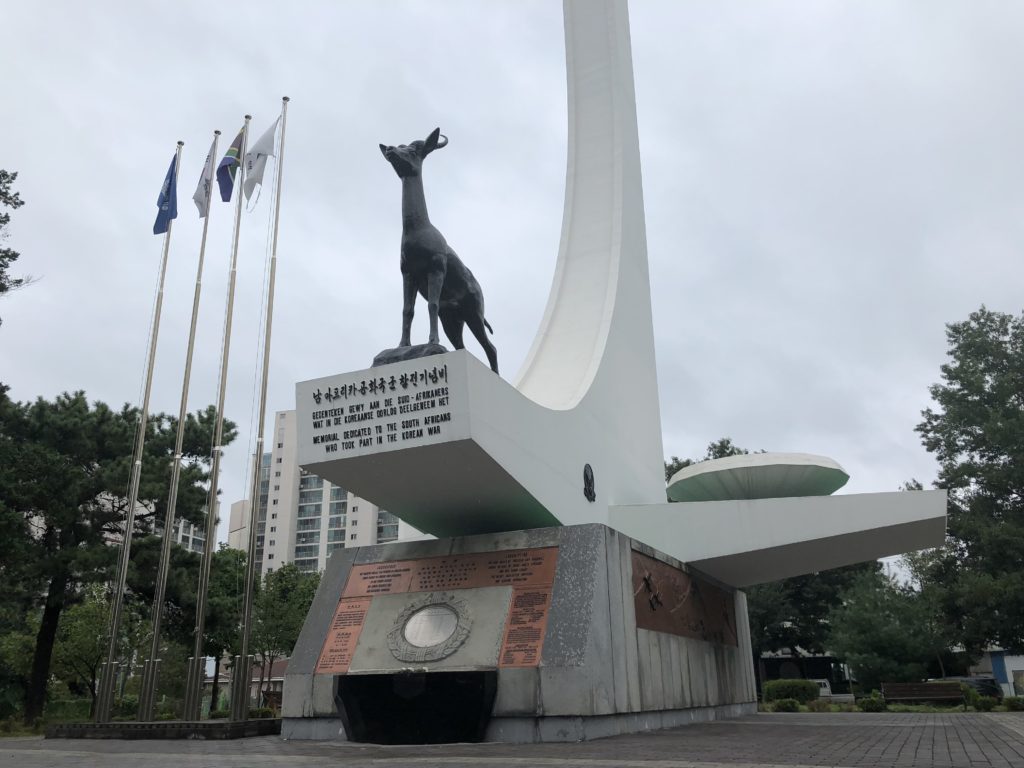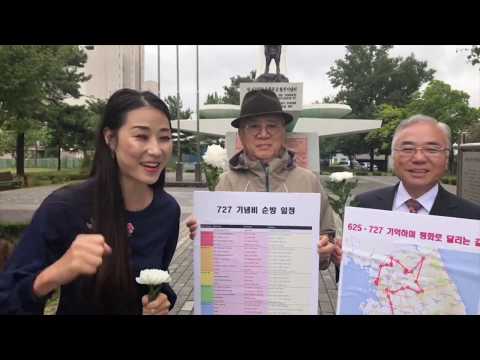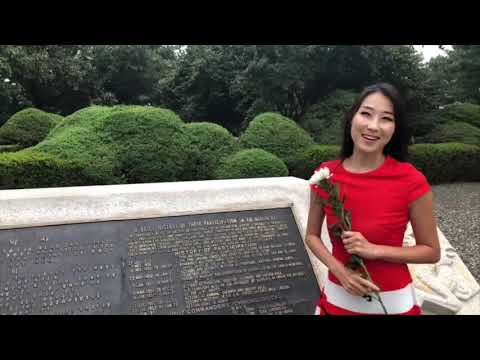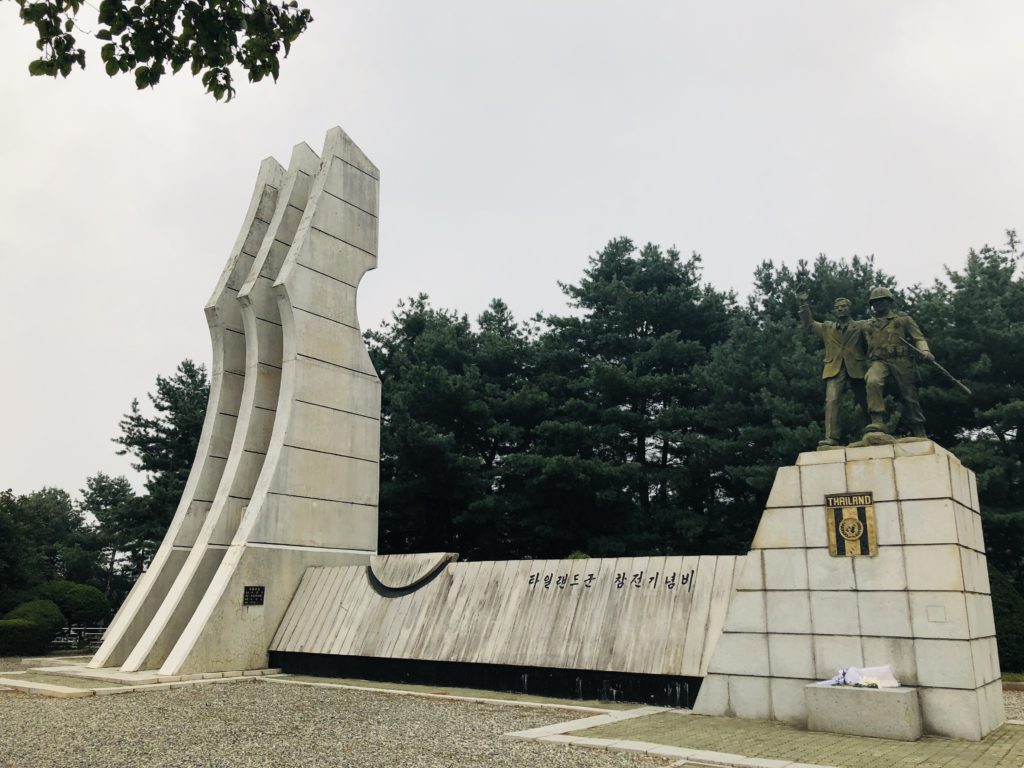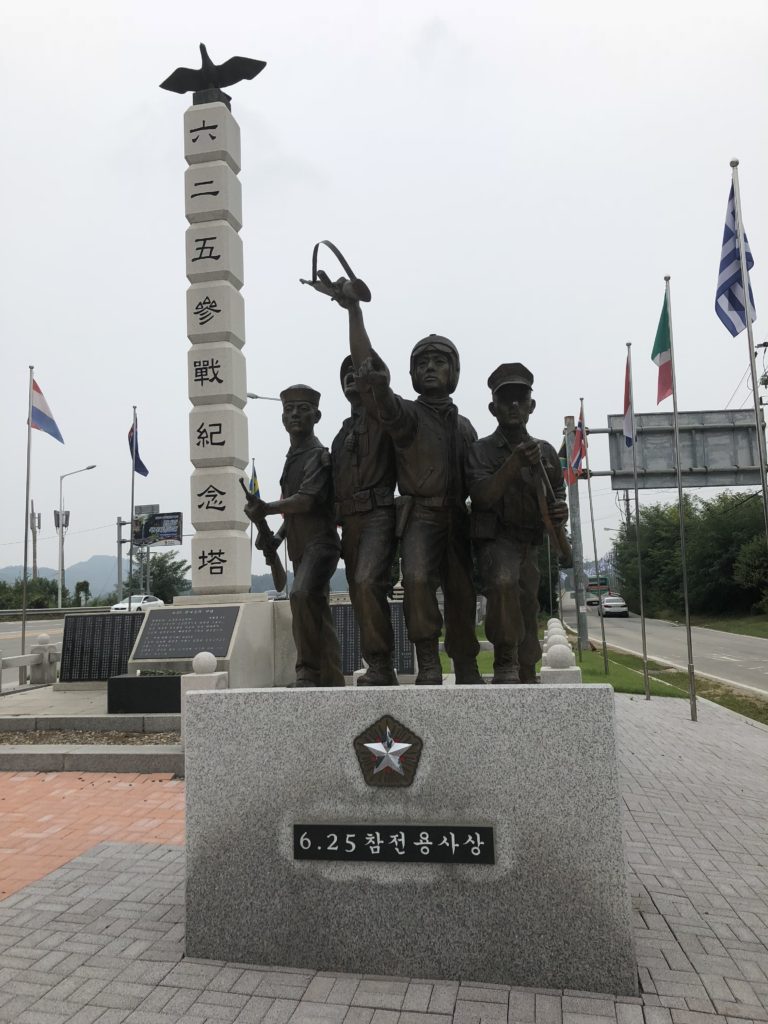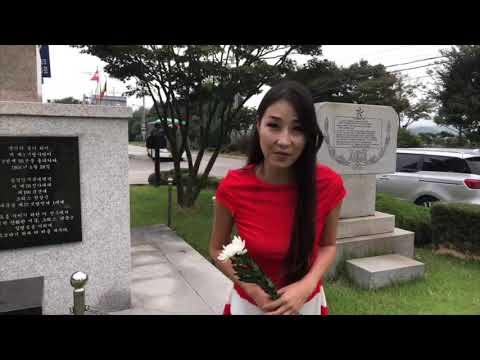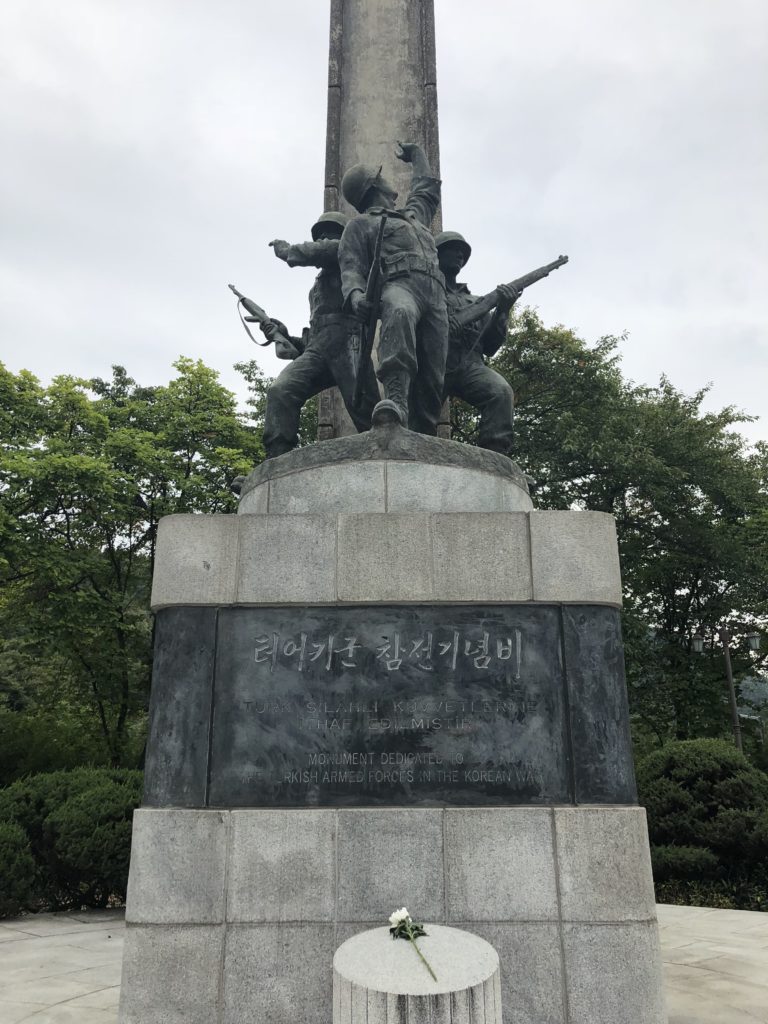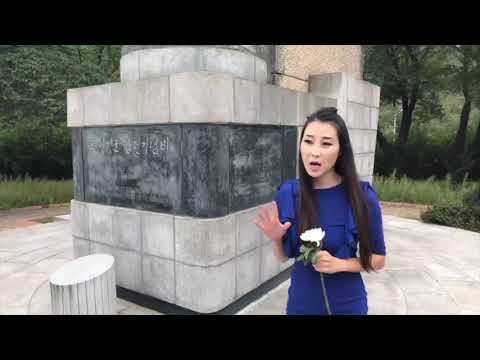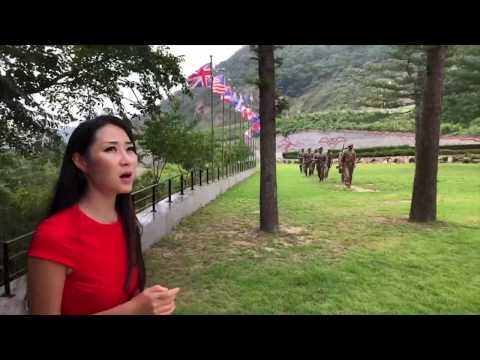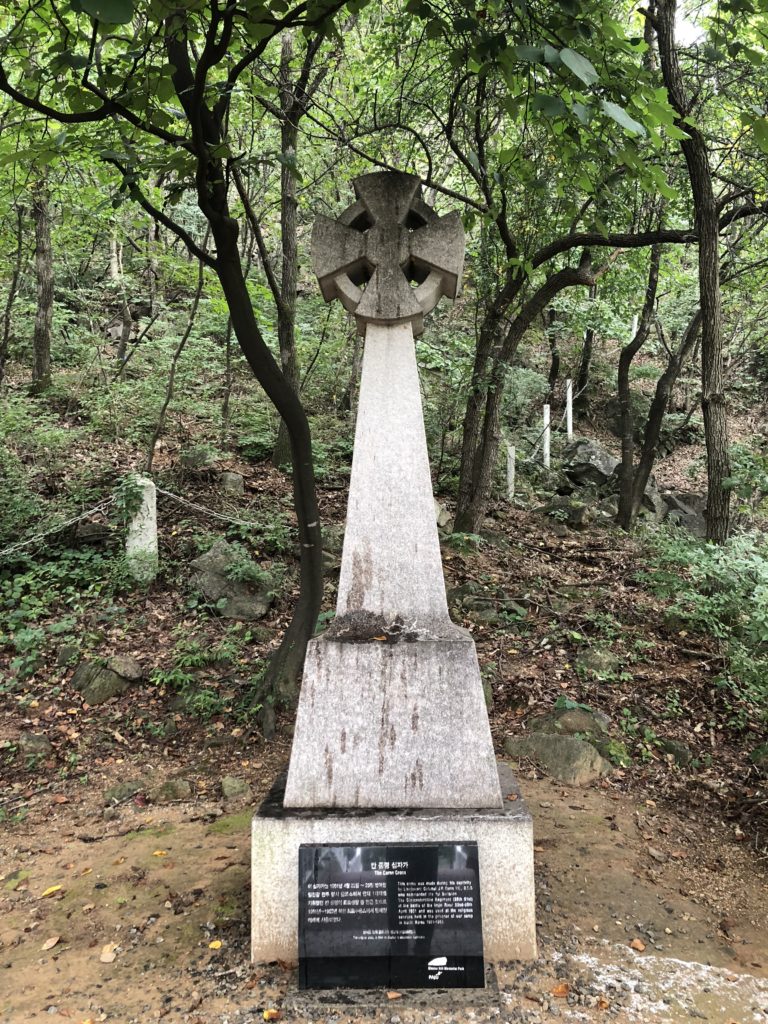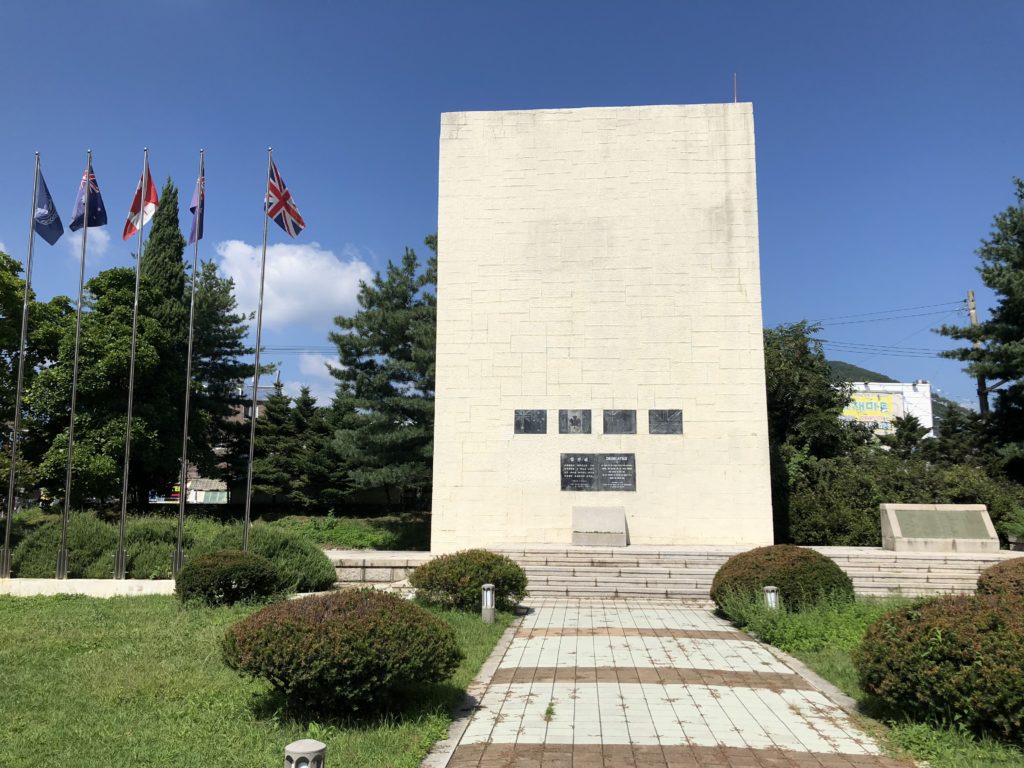Click on different countries and cities to explore Korean War memorials around the world!
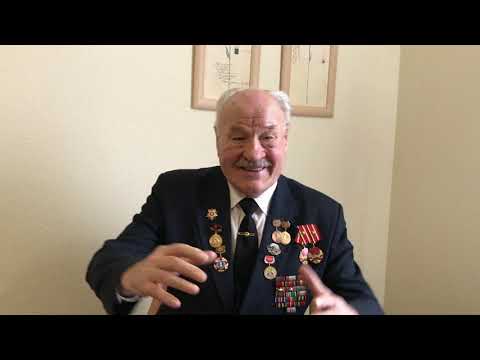
[FOREIGN LANGUAGE]
>> My name is Vladimir Polage Arsenio. I was born in 1938, and I was born in a big, huge family. There were 11 children in our family.
[FOREIGN LANGUAGE]
>> My high gradation of high education, I came to Moscow to complete ... to continue my education.
[FOREIGN LANGUAGE]
>> When I entered college, I studied for 3 years.
[FOREIGN LANGUAGE]
>> And I had ... After graduation of college, I had to go to army to serve for the army.
[FOREIGN LANGUAGE]
>> I had a duty to go to army without any exceptions, and I was a 4th-year student at that time.
[FOREIGN LANGUAGE]
>> In '50s, 25th of July, there was a broke up in war at that time.
[FOREIGN LANGUAGE]
>> And the Soviet Union, the government of Soviet Union ...
[FOREIGN LANGUAGE]
>> ... didn't support, didn't want to support so much, so as we didn't have enough resources to support that situation.
[FOREIGN LANGUAGE]
>> After the army, I was ... I went to veterans service, special college for special technique, space kind of aircrafts, special.
[FOREIGN LANGUAGE]
>> We started equipment, military equipment, which would were not used yet because that was brand-new technologies.
[FOREIGN LANGUAGE]
>> After mutual agreement between North Korea and Soviet Union, there was no agreement for support, mutual support, but Kim Il-sung, he insisted Soviet Union to support in that war, in Korean War.
[FOREIGN LANGUAGE]
>> Stalin was the request of Mao Zedong and Kim Il-sung ...
[FOREIGN LANGUAGE]
>> ... by request made a decision to support North Korea ...
[FOREIGN LANGUAGE]
>> ... through a nation and special rated technical equipment with a lot of special military equipment.
[FOREIGN LANGUAGE]
>> In the beginning, Stalin thought that we will just give an equipment and not people, just give equipment, but people were not supposed to be involved in the war.
[FOREIGN LANGUAGE]
>> But when Koreans got that equipment, weapons, they couldn't work because that equipment was special on the radioactive airplanes, special.
[FOREIGN LANGUAGE]
>> The speed was really high speed.
[FOREIGN LANGUAGE]
>> And the [INAUDIBLE] radioactive technical equipment, it was not ... they were ... They couldn't have a ... They couldn't be involved in the war due to lack of knowledge, how to use that equipment. They couldn't fight with ... in the war.
[FOREIGN LANGUAGE]
>> So the Soviet Union made a decision ...
[FOREIGN LANGUAGE]
>> ... to give people and the technology and the equipment ...
[FOREIGN LANGUAGE]
>> ... the airplanes, pilots and [INAUDIBLE] all specialists who were involved who were high specialist to use who knew how to use those equipment and those high technology weapons.
[FOREIGN LANGUAGE]
>> There was a special ... They were created a special conference, which involved a lot of high ... a lot of group of ... Different group of, so to say, military, military as a group and a lot of high generals and, so to say, highly specialists, highly qualified specialists.
[FOREIGN LANGUAGE]
>> I can say begin ... to begin to shoot first, but ...
[FOREIGN LANGUAGE]
>> ... Americans helped South Korea a lot. They supported.
[FOREIGN LANGUAGE]
>> The purpose was to take over North Korea.
[FOREIGN LANGUAGE]
>> Then in the beginning, the North Korean army crossed ...
[FOREIGN LANGUAGE]
>> ... the border, and there were no any agreements. There were no any mutual discussions at that time.
[FOREIGN LANGUAGE]
>> [INAUDIBLE] in South Korea, and they were planning to use military methods to solve this issue.
[FOREIGN LANGUAGE]
>> Due to military political situation, happened that way.
[FOREIGN LANGUAGE]
>> We didn't want that North Korean could be under South Korea, could be taken over by South Korea, we didn't want, so this kind of actions already they were taken by the commander of chiefs ...
[FOREIGN LANGUAGE]
>> ... of all unified army by Douglas MacArthur.
[FOREIGN LANGUAGE]
>> He wanted to use the [INAUDIBLE] to ...
[FOREIGN LANGUAGE]
>> ... until they used the atomic weapon.
[FOREIGN LANGUAGE]
>> The government [INAUDIBLE] stopped him ...
[FOREIGN LANGUAGE]
>> ... and thought it will be a third World War, World War III, so Truman liberated the US MacArthur to ask him not to be a Commander of Chief over the American Army.
[FOREIGN LANGUAGE]
>> And the 38th parallel ...
[FOREIGN LANGUAGE]
>> ... the border between South and North Korea ...
[FOREIGN LANGUAGE]
>> ... in the end of war in 1951 ...
[FOREIGN LANGUAGE]
>> ... due to people came to realization that North and South, neither North nor South Korea won't be able to be winners in this. Nobody will be a winner.
[FOREIGN LANGUAGE]
>> So they decided to go into negotiation, and this negotiations were in effect until ... And prolonged until 27th of July of '51, 1951.
[FOREIGN LANGUAGE]
>> Everyone understood that from the ...
[FOREIGN LANGUAGE]
>> ... Soviet Union was behind the North Korea, and South Korea was supported by the United States of America, and understood that two super countries were involved in this war, and everyone understood that.
[FOREIGN LANGUAGE]
>> [INAUDIBLE] result, so ...
[FOREIGN LANGUAGE]
>> ... my involvement into the war, I was the main specialist on the radioactive weapons ...
[FOREIGN LANGUAGE]
>> ... stations.
[FOREIGN LANGUAGE]
>> That's radioactive stations were used for the first time in history in Korean War.
[FOREIGN LANGUAGE]
>> I was a specialist to provide on those radioactive stations, and they were included special batteries inside those stations.
[FOREIGN LANGUAGE]
>> There were three batteries, and in the division there are three groups of soldiers so in every [INAUDIBLE] ...
[FOREIGN LANGUAGE]
>> ... there were three stations.
[FOREIGN LANGUAGE]
>> So there were eight guns, special guns, but they have are very powerful.
[FOREIGN LANGUAGE]
>> My task was to provide security for the area which we're protecting, so the North Korea.
[FOREIGN LANGUAGE]
>> There were special [INAUDIBLE] for far vision to recognize the enemy from the far aside.
[FOREIGN LANGUAGE]
>> And those stations, when they recognize the enemies coming from the south [INAUDIBLE] and American weapons and ammunitions were very strong. B-29 probably you might know, and the special airplanes, using the airplanes the [INAUDIBLE] F-86 if you have known.
[FOREIGN LANGUAGE]
>> So that kind of military special aviation is ... And that special station recognizes from far away distance, and you saw the information through the radiation station, weapon station. When they get these information details, call the ...
[FOREIGN LANGUAGE]
>> They provide special indicators, special, so to say, indicators, and their location.
[FOREIGN LANGUAGE]
>> When they arrived to get the purpose to go there to realize their purpose.
[FOREIGN LANGUAGE]
>> The station ...
[FOREIGN LANGUAGE]
>> ... radiation station that recognizes them, it has already their coordinates, their, so to say, [INAUDIBLE].
[FOREIGN LANGUAGE]
>> So we had a special also another equipment that could really calculate special, so to say, calculate their speed and whatever that they can make the ... meet in the air to, so to say, fight.
[FOREIGN LANGUAGE]
>> But this kind of lesson is not the only one.
[FOREIGN LANGUAGE]
>> The special task of that military group is prevent and protect, not let this enemy's aviation to bomb, to be able to bomb ...
[FOREIGN LANGUAGE]
>> ... prevent from the bombing.
[FOREIGN LANGUAGE]
>> So there was a second method to ... of the protection. That is fire.
[FOREIGN LANGUAGE]
>> All weapons were constructed in a space ...
[FOREIGN LANGUAGE]
>> ... and all the weapons shoot that special space, and the pilots see that hurting, and he make decision to break, and then the enemy's airplane would be destroyed absolutely ...
[FOREIGN LANGUAGE]
>> ... no way to survive.
[FOREIGN LANGUAGE]
>> So when they saw that special kind of equipment, they just turned around and went back.
[FOREIGN LANGUAGE]
>> They bombed different area, not the area that they wanted ... that they had in their original purpose to do.
[FOREIGN LANGUAGE]
>> So this kind of war we had of that special group of high technology weapon ...
[FOREIGN LANGUAGE]
>> ... my task was to provide that all these mechanisms, all these weapons could really work absolutely, 100 percent perfectly.
[FOREIGN LANGUAGE]
>> Next, as for aviation ...
[FOREIGN LANGUAGE]
>> ... when the enemy's aviation came out, then our pilots also flew on the sky.
[FOREIGN LANGUAGE]
>> They just go to meet them.
[FOREIGN LANGUAGE]
>> And there is a air war.
[FOREIGN LANGUAGE]
>> This is the masses of pilots shooting really highly and Russian airplanes were in Korea, MiG-15. Yeah, the ...
[FOREIGN LANGUAGE]
>> On American side ...
[FOREIGN LANGUAGE]
>> ... F-86, the system Sabre.
[FOREIGN LANGUAGE]
>> Air war, you can imagine that what it is like.
[FOREIGN LANGUAGE]
>> As a matter of fact, the one who is leading or who is follower, leader and the follower, they are like one pair.
[FOREIGN LANGUAGE]
>> It used to be ... That kind of tactic is used to be not just in Soviet military system, but also Americans used that method too.
[FOREIGN LANGUAGE]
>> The task is ...
[FOREIGN LANGUAGE]
>> ... of the follower, the task of the follower is to be involved with the fight, but the leader shoot, protect ...
[FOREIGN LANGUAGE]
>> ... his tail, so to say, that Americans wouldn't be able to shoot and to hit, to shoot the air.
[FOREIGN LANGUAGE]
>> So what do the special [INAUDIBLE] ...
[FOREIGN LANGUAGE]
>> ... weapons [INAUDIBLE] was Americans decided that they lost the war, and half of them leave.
[FOREIGN LANGUAGE]
>> Our pilots come back to their airports.
[FOREIGN LANGUAGE]
>> When they were landed, American airplanes came suddenly, unexpectedly came out from somewhere.
[FOREIGN LANGUAGE]
>> And when the pilot already lost his everything, lost his control because it's unexpected situations, so, of course, in this case, usually American pilots, they hit, and they shoot, and the Soviets, Russians, they drive off course.
[FOREIGN LANGUAGE]
>> And for this, there were special guns.
[FOREIGN LANGUAGE]
>> When they see our airplane come to land, and those [INAUDIBLE] special weapon shoot that American airplane, and it just ...
[FOREIGN LANGUAGE]
>> They shoot, so in this ... From this perspective, that landing weapon specialist, they were very successful and very helpful from that perspective.
[FOREIGN LANGUAGE]
>> So this manner of war happened every day, so I've been involved with this work for 6 months, 6 months, no rest, only war, 6 months.
[FOREIGN LANGUAGE]
>> What was the danger time.
[FOREIGN LANGUAGE]
>> When that landing special equipment working to prevent from the enemy's airplanes ...
[FOREIGN LANGUAGE]
>> ... it was a danger.
[FOREIGN LANGUAGE]
>> We shoot our own soldiers due to the small pieces of weapons they coming back, so there is a danger like that.
[FOREIGN LANGUAGE]
>> So this way ...
[FOREIGN LANGUAGE]
>> ... there was ... had happened the war.
[FOREIGN LANGUAGE]
>> First time in the history, air war ...
[FOREIGN LANGUAGE]
>> ... was used.
[FOREIGN LANGUAGE]
>> Air war was used in Korean War ...
[FOREIGN LANGUAGE]
>> ... for the first time.
[FOREIGN LANGUAGE]
>> The main military weapons highly technology ...
[FOREIGN LANGUAGE]
>> ... were used.
[FOREIGN LANGUAGE]
>> From night to night, they began to use them, which there were pilots fighting whenever support special landing military highly equipment supported a lot that pilot to protect them.
[FOREIGN LANGUAGE]
>> So after all the fighting, the battles, in 1953, on July 27th, the Armistice Agreement was signed. Can you explain a little bit about what he remembers about the armistice?
[FOREIGN LANGUAGE]
>> When made a decision to stop, they fired ...
[FOREIGN LANGUAGE]
>> ... part of a mission.
[FOREIGN LANGUAGE]
>> We were on the Chinese territory and the other part of the Korean territory.
[FOREIGN LANGUAGE]
>> We were on the Korean territory.
[FOREIGN LANGUAGE]
>> And our main task was to protect and object of the state of military manner. That was the breach from the [INAUDIBLE].
[FOREIGN LANGUAGE]
>> That was [INAUDIBLE] from ... when from China came weapons and products. All this came from China to the Soviet Union.
[FOREIGN LANGUAGE]
>> So Americans knew about the value of this breach, and they tried to do everything to destroy it.
[FOREIGN LANGUAGE]
>> The second object that was protected by the North that the stations, that the [INAUDIBLE] was on the Yauza River, provided a northeast part of China, part of Manchuria that was stationed very valuable ...
[FOREIGN LANGUAGE]
>> ... important, and American military offices, generals, they really understood the importance of that object as well.
[FOREIGN LANGUAGE]
>> The third task for the aviation to provide ...
[FOREIGN LANGUAGE]
>> ... transportation inside the territory, so the soldiers couldn't wear, couldn't carry the weapons in their pockets, so there should be ... They're supposed to fly it and protect ... fly the weapons, special weapon soldiers ...
[FOREIGN LANGUAGE]
>> ... through the river and through the land.
[FOREIGN LANGUAGE]
>> It was also another task for their aviation and sent special land soldiers group.
[FOREIGN LANGUAGE]
>> And when they came to agreement on 27th of July in Panmunjom ...
[FOREIGN LANGUAGE]
>> ... you've heard about it.
[FOREIGN LANGUAGE]
>> From the North Korea and South Korea and from the American ...
[FOREIGN LANGUAGE]
>> ... nobody ... Not everyone signed this agreement, not everyone.
[FOREIGN LANGUAGE]
>> But still, the kind of stopping ... to stop war to make some peace. Actually, it began to act.
[FOREIGN LANGUAGE]
>> It was considered, this period of time political powers as well as the leaders of other states would ...
[FOREIGN LANGUAGE]
>> ... would begin more deep work on agreement for a long, long time to make peace.
[FOREIGN LANGUAGE]
>> But it didn't happen.
[FOREIGN LANGUAGE]
>> So as a matter of fact, we have 64 years now, 64 years we live no war, no peace.
[FOREIGN LANGUAGE]
>> And there is [INAUDIBLE].
[FOREIGN LANGUAGE]
>> There is no [INAUDIBLE].
[FOREIGN LANGUAGE]
>> But the next leaders who came after these leaders, they still did not came to agreement.
[FOREIGN LANGUAGE]
>> So my personal opinion is in my opinion from the political point of view the coalition in South Korea or in the North Korea, but according to the territory, the [INAUDIBLE] is the same so this is nonreason ...
[FOREIGN LANGUAGE]
>> ... another one that life in South Korea ...
[FOREIGN LANGUAGE]
>> ... is more high in terms of welfare and the prosperity.
[FOREIGN LANGUAGE]
>> And everyone wants to unite, but everyone has [INAUDIBLE] ...
[FOREIGN LANGUAGE]
>> The South ... No one wants to unite based upon the socialism, but South wants to unite based upon ... democracy, exactly, right.
[FOREIGN LANGUAGE]
>> So ...
[FOREIGN LANGUAGE]
>> And [INAUDIBLE] that we don't have this agreement still now, and the result of this war are [INAUDIBLE].
[FOREIGN LANGUAGE]
>> Over 9 million people died in this war.
[FOREIGN LANGUAGE]
>> And two third part of them is local people.
>> The Koreans.
>> Inhabitants, the civil people.
[FOREIGN LANGUAGE]
>> I can say that Americans and South Korea, they lost over 500,000 people.
[FOREIGN LANGUAGE]
>> Chinese, China were 1 million people.
[FOREIGN LANGUAGE]
>> UN, 500,000 people.
[FOREIGN LANGUAGE]
>> Soviet Union also lost approximately 300,000, 220 pilots and others, the special soldiers who were controlling that equipment from the land.
[FOREIGN LANGUAGE]
>> A lot of airplanes were shot for all kind of different kind of airplane, the 86, the 89 [INAUDIBLE], 86, all different type of airplane.
[FOREIGN LANGUAGE]
>> One thousand two hundred airplanes were shot in that war.
[FOREIGN LANGUAGE]
>> And that special land support soldiers, they shot 200 airplanes.
[FOREIGN LANGUAGE]
>> So we had 305 people, yeah?
[FOREIGN LANGUAGE]
>> And from the landing, approximately 70 people, those who were providing with the special equipment from the land soldiers, the specialists, greater technical specialists.
[FOREIGN LANGUAGE]
>> So this is the result of the war, and nothing about the economical loss from the economical perspective.
[FOREIGN LANGUAGE]
>> We can say that in the beginning that this is a civil war between South and North, but actually it became the political powers also were involved.
[FOREIGN LANGUAGE]
>> Now I can answer all your questions.
>> What ...
[FOREIGN LANGUAGE]
>> If I didn't say something, so you're welcome to ask them.
>> So the war hasn't ended. Do you think ... Do you have hope that it could end in the future and there will be peace be two Koreas?
[FOREIGN LANGUAGE]
>> It's hard to say at the moment.
[FOREIGN LANGUAGE]
>> I have a hope that it can be, but so I thought in many international conferences and congresses.
[FOREIGN LANGUAGE]
>> But I can make [INAUDIBLE] for the nearest future to come to agreement for the South and for the North Koreans it's quite difficult unfortunately.
[FOREIGN LANGUAGE]
>> Have you visited either North or South Korea?
[FOREIGN LANGUAGE]
>> I've been to Seoul in South Korea at the International Conference.
[FOREIGN LANGUAGE]
>> It was dedicated to world peace, and one issue was about the unification of North and South Korea, and I spoke in my report on this special conference.
[FOREIGN LANGUAGE]
>> And I tried ... I insisted to state, the leaders of the states of the South and North Korea listen to their people and make a decision to unite.
[FOREIGN LANGUAGE]
>> After my speech in that conference ...
[FOREIGN LANGUAGE]
>> I got ... I received an international diploma as an ambassador for peace, very big, very beautiful one.
>> Thank you because I ...
[FOREIGN LANGUAGE]
>> ... because the more people like him advocate for peace, maybe the leaders will listen.
[FOREIGN LANGUAGE]
>> I don't give up on the theme about Korea still.
[FOREIGN LANGUAGE]
>> I have a lot of articles that are devoted to problem of Korea, Korean War, so I give you as a gift the copy of my articles.
[FOREIGN LANGUAGE]
>> Maybe I couldn't [INAUDIBLE] ...
[FOREIGN LANGUAGE]
>> So you can find in my articles full answers.
[FOREIGN LANGUAGE]
>> One more important moment I want to say, once ...
[FOREIGN LANGUAGE]
>> From one Korean professor from Korean university, I was ... came to my home.
[FOREIGN LANGUAGE]
>> So we were talking just like [INAUDIBLE].
[FOREIGN LANGUAGE]
>> He took pictures.
[FOREIGN LANGUAGE]
>> He took all materials, everything I had at home about Korea, and he said, he promised that they will write article with ... use my opinion and so on and so forth, so where are they?
[FOREIGN LANGUAGE]
>> They didn't give any contact to me, and I don't know who did I talk to.
[FOREIGN LANGUAGE]
>> They give me some business cards.
[FOREIGN LANGUAGE]
>> I have their contact, but nothing happened after that.
[FOREIGN LANGUAGE]
>> No ... There is no contact with them, no connections unfortunately.
>> I will keep in touch with him.
[FOREIGN LANGUAGE]
>> Why does he care ... Ask him, why do you care so much about Korea? Does his friends and comrades care about Korea too?
[FOREIGN LANGUAGE]
>> Because Korean War was the worst bloodless, bloody war, a lot of blood.
[FOREIGN LANGUAGE]
>> I saw a lot of blood, a lot of tears, a lot of fire.
[FOREIGN LANGUAGE]
>> And all these disasters, I experienced all these things, and I'm against any war, and I don't ... I can't agree with kind of disagreement that's going on, the kind of fake agreements that exist between these two countries. I can't agree with that. I want to finish that, want to make it peace.
[FOREIGN LANGUAGE]
>> And now I am as an ambassador of peace, I really provide that peace policy among youngsters at the moment.
[FOREIGN LANGUAGE]
>> I am very mad about this Korea that's going on now and a lot of people dying, and we can't do nothing.
[FOREIGN LANGUAGE]
>> All the time that no man would have conflicts, so war is going on.
[FOREIGN LANGUAGE]
>> Usually, all wars, they end with a certain agreement, certain document.
[FOREIGN LANGUAGE]
>> And all issues were discussed at the table during the negotiation between two or few countries. Usually this is the way supposed to be after the end of the war.
[FOREIGN LANGUAGE]
>> Here is pictures where the conference were dedicated the unification for the Korea, unification between Korea, South and North Korea. That's conferences were dedicated to Korea issue, especially unification, so ...
>> Can he explain a little bit about his medals.
[FOREIGN LANGUAGE]
>> This is professor [INAUDIBLE]. He's a professor. He gave me this business card. He is a professor in Seoul. He took a lot of materials from me.
>> When?
[FOREIGN LANGUAGE]
>> This is Dr. Bohim Pak.
[FOREIGN LANGUAGE]
>> This is Dr. Bohim Pak.
[FOREIGN LANGUAGE]
>> Two years ago.
[FOREIGN LANGUAGE]
>> Two years ago.
>> Explain to me a little bit about your medals.
[FOREIGN LANGUAGE]
>> These two medals the Chinese, that's from China.
[FOREIGN LANGUAGE]
>> We had an agreement with China, an agreement about mutual support, but Korea, though we had an agreement, they didn't give us any medals.
[FOREIGN LANGUAGE]
>> I don't have any medals from Korea. That's why.
>> From the North.
>> From North Korea, yeah.
[FOREIGN LANGUAGE]
>> But I really fought really earnestly with all of my heart for the freedom of Korea and Korean people.
[FOREIGN LANGUAGE]
>> As for the other medals, are from the World War II, and after the war, I finished. I graduated the Moscow Engineering Institute.
[FOREIGN LANGUAGE]
>> I work in the naval, military naval.
[FOREIGN LANGUAGE]
>> I was a main specialist to provide assistance ...
[FOREIGN LANGUAGE]
>> ... for ... to protect humans' in enclosed space.
>> I have another question. Do other veterans of the Korean War in Russia share his views and his hope for unified Korea?
[FOREIGN LANGUAGE]
>> Have a section of veterans of Korean War.
[FOREIGN LANGUAGE]
>> The head of this section is the general Karovich.
[FOREIGN LANGUAGE]
>> He's a Hero of the Soviet Union. Did you hear his name?
>> The Heroes Club.
>> The Hero, the club, yes.
[FOREIGN LANGUAGE]
>> I was a member of that club.
[FOREIGN LANGUAGE]
>> I tried to get any memories from other scholars, with other veterans [INAUDIBLE] successful as people lost their memories, and now over 90 years old, and most of them can't walk. They are lying in bed.
[FOREIGN LANGUAGE]
>> And when I was working in the interest of Navy interest, military, naval ...
[FOREIGN LANGUAGE]
>> [INAUDIBLE] I got PhD on technical sciences on that issue.
[FOREIGN LANGUAGE]
>> And I successfully worked on that kind of system, on using that system, developing that system?
[FOREIGN LANGUAGE]
>> So atomic submarine is able to be 24 hours underground safe instead of 1 or 2 hours.
>> One more question.
[FOREIGN LANGUAGE]
>> Today, we went to the memorial.
[FOREIGN LANGUAGE]
>> I saw World War ...
[FOREIGN LANGUAGE]
>> I saw World War I memorial, two World War II memorial ...
[FOREIGN LANGUAGE]
>> So here he said that after he has finished his work, some of his comrades, but they are from naval comrades, they gave him that kind of a letter of gratitude, and he would like to give it to you too because they have written here some information about him and about his work and about everything.
>> Yes, going back to the memorial, I visited World War I memorial, World War II memorial, the UN memorial and the International Soldier Memorial.
[FOREIGN LANGUAGE]
>> And I was ...
[FOREIGN LANGUAGE]
>> I go very often there to that memorial all the time.
>> Me too, in Washington, DC, I go to the memorial all the time.
[FOREIGN LANGUAGE]
>> He wants to continue about medals.
>> Oh, oh.
[FOREIGN LANGUAGE]
>> He has five medals from military naval.
>> Oh.
[FOREIGN LANGUAGE]
>> And very universals medals, which were dedicated to generals, Admiral Gorshkov and specialty top leaders, top commanders in chief from the military. They're from World War II, so ...
[FOREIGN LANGUAGE]
>> In general, he has 22 medals from the government and from the different state medals ...
[FOREIGN LANGUAGE]
>> ... and more than over 10. He has special appreciations signs like medals, some kind of medals and as a type of medal. They're high enough level of appreciation medal, special medals, and there are ordinary medals.
[FOREIGN LANGUAGE]
>> I'm an honored inhabitant of Moscow City.
>> I'm honored to meet you.
[FOREIGN LANGUAGE]
>> So going back to the memorial ...
[FOREIGN LANGUAGE]
>> ... in the United Nations memorial, I saw four statutes, one Soviet soldier, Russian soldier, American soldier, British soldier and French soldier against Hitler.
[FOREIGN LANGUAGE]
>> So I was very sad ...
[FOREIGN LANGUAGE]
>> ... because 5 years later in the Korean War, the people that fought together in World War II had to fight against one another.
[FOREIGN LANGUAGE]
>> That is war.
[FOREIGN LANGUAGE]
>> I hope that ...
[FOREIGN LANGUAGE]
>> ... this war will end, Korean War will end, and there will be peace, and there will be reconciliation and that ... I call all the veterans my grandpas. I call all the veterans of the Korean War my grandpas.
[FOREIGN LANGUAGE]
>> I hope ...
[FOREIGN LANGUAGE]
>> ... that my American grandpas and he be friends.
[FOREIGN LANGUAGE]
>> We are good friends. Please, look.
>> Because he was a general, right?
[FOREIGN LANGUAGE]
>> General.
[FOREIGN LANGUAGE]
>> Yes.
[FOREIGN LANGUAGE]
>> Please, look at his hands.
[FOREIGN LANGUAGE]
>> Look at his hands.
>> So I would like to call him my grandpa too ...
[FOREIGN LANGUAGE]
>> Yes, you are welcome, please.
>> ... because we are fighting for peace together in Korea.
[FOREIGN LANGUAGE]
>> That's right, very good. Yes.
>> I'm going to go and hug him.
[FOREIGN LANGUAGE]
>> I want to say a few words.
>> Oh, okay.
>> May I say a few more words, please?
[FOREIGN LANGUAGE]
>> We old generation, we made a lot of things.
[FOREIGN LANGUAGE]
>> We fought against a system. We won, and I hope that giving our, sharing our traditions, Russian and American friendship, people, youngsters, please, take charge in your hands and do everything to stop war, to finish all wars all over the world. This is what I teach, youngsters.
[FOREIGN LANGUAGE]
>> Thank you.
[FOREIGN LANGUAGE]
>> Thank you.
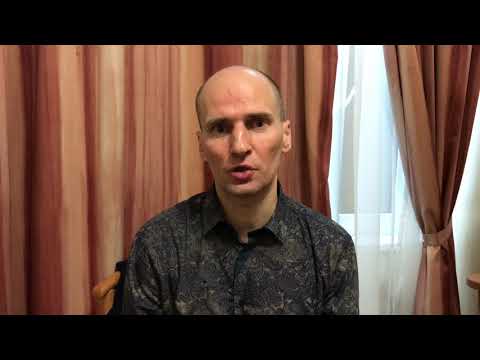
>> My name is Constansion, Jerinof Constansion. [FOREIGN LANGUAGE]
>> Okay. So it's a great honor for me to see our guest, Ms. Hannah, and I'm very glad that she came here to Moscow because she's doing the same work that I'm doing here in Russia.
>> [FOREIGN LANGUAGE]
>> So I started my project in 2009.
>> [FOREIGN LANGUAGE]
>> That was the 60-years anniversary of the beginning of the Korean War.
>> [FOREIGN LANGUAGE]
>> In the USA, the Korean War is called the forgotten war.
>> [FOREIGN LANGUAGE]
>> And in Russia just as well. Nobody knows anything about it.
>> [FOREIGN LANGUAGE]
>> So even children and grandchildren of the people who participated in the Korean War do not know that their dad or their granddad participated in this war, or maybe they know something, but they do not know any details.
[FOREIGN LANGUAGE]
>> And the reason was that every veteran of the Korean War signed a document where he promised not to disclose state secret.
[FOREIGN LANGUAGE]
>> Not many people participated in that war if we compare the number of participants with the number of those who participated in future wars of the Soviet Union, and that's why the public didn't get really interested in that war.
>> [FOREIGN LANGUAGE]
>> And another reason is that our ally that is North Korea also didn't like to speak about the role of the Soviet Union in that war.
>> [FOREIGN LANGUAGE]
>> That's why in 2009, I decided to make a project that would make this information more public.
>> [FOREIGN LANGUAGE]
>> So it happens so that at that time, the veterans of the Korean War decided to establish their own museum, and I offered them my help as a designer.
>> [FOREIGN LANGUAGE]
>> So that is the way I started the public project, and also I established a special Internet site where I was thinking about different events of the Korean War.
>> [FOREIGN LANGUAGE]
>> That became known, and in February 2010, I was offered to prepare special edition of this magazine that was almost completely devoted to the Korean War.
>> [FOREIGN LANGUAGE]
>> So in this magazine, you can find my program statements, so my ideas, my actions, and also have I've put in different specialist, paleontologists and historians.
>> [FOREIGN LANGUAGE]
>> And after that, I started doing other things, things devoted to different memorials for this war and also in the territory of North Korea.
>> [FOREIGN LANGUAGE]
>> And now I want a monument to be made in the territory of North Korea, and if the authorities allow me to do it, then I'm going to collect funds for this monument. This monument will be established at the place of death of our soldiers.
[ Chatter ]
>> [FOREIGN LANGUAGE]. This photograph, [FOREIGN LANGUAGE].
>> It's not me. It's Kim Ursan with the veterans.
>> [FOREIGN LANGUAGE]
>> And I think that in this photo, there are only two veterans of the Korean War: this one and this one. This is General Komerenka.
>> [FOREIGN LANGUAGE]
>> And this is Yevgeny Pepelyaev, one of the best pilots of the Korean War.
>> [FOREIGN LANGUAGE]
>> And this magazine was prepared to the anniversary of the finish of the Korean War.
>> [FOREIGN LANGUAGE]
>> Here, there is an interview of the veteran who is going to come tomorrow.
>> [FOREIGN LANGUAGE]
>> So I invited him to come to South Korea, and after that, he was called a traitor, and no one wanted to talk to him.
>> [FOREIGN LANGUAGE]
>> So he's a pioneer for the united Korea.
>> [FOREIGN LANGUAGE]
>> He doesn't share many of radical views to the Korean War, and that's why he's such an interesting person.
>> [FOREIGN LANGUAGE]
>> He also think that a united Korea is inevitable.
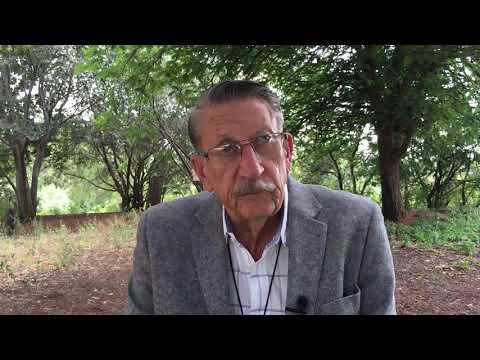
>> My name is Denis Earp, Earp as in Wyatt Earp. I'm now 86 years old, but in 1950, when the Korean War broke out, I was still only 20, and I hadn't finished my flying training, but the government of South Africa asked for volunteers because for once, the United Nations was able to function as it should, by a pure accident of the Soviets having become angry at something or other, and so they didn't attend. Now at the time, the government decided that the best thing to do would be to send a fighter squadron. Having made some arrangements with the Americans so that we would pay for everything we used, all armament, fuel, aircraft, equipment, everything because all of us were volunteers, which I think makes it a little different story for many other countries. 1950, I spent in great tension following the progress of the Korean War down from the 38th Parallel down to the Pusan perimeter, the breakout at Imjin, the pursuit northwards because I was worried the war would be over before I could get there. I was a second lieutenant, as I said, still on flying training, and I didn't get my wings until December of 1950. Straight after that, Spitfire conversion and operational conversion, and then as soon as we could, we went to Korea, which I reached the end of May, 1951. Now it's a time long ago. Things are different now, but make no mistake. The Korean War was not a quarrel. It was a very big, very important, very violent war, and it made a point in stopping Soviet aggression because the manipulation of Korea was just a byproduct of the Cold War. China and Russia knew what was coming, and they were hoping to break the West's monopoly of resistance in the West. Strangely enough, I think it happened because an American foreign minister made a statement which the Chinese particularly misinterpreted. In an interview in, I think, the early '50s, he said which areas were vital for America, and he named them all over the West, but he did not mention Korea, so the Chinese and the North Koreans interpreted this as being a disengagement on the part of the United States, which it most definitely was not. But America was totally unprepared. When the Korean War broke out, South Korea was not ready for it. It was almost a miracle that the American logistics could reinforce the Pusan perimeter and mobilize allied forces quickly enough to stop having to retreat to Japan because then I think it would have been a very, very long war. In any case, as a second lieutenant, not a student of politics, just a young man, stupid as all young men are, I ended up in a very hot war. As a second lieutenant, my probability of surviving the first few combat missions were low, but you learn very quickly, or you don't survive, and quite a few of my friends were killed. Older and more experienced pilots were killed, and that's a bit of a shock to the system of a young man because you keep believing, "It cannot happen to me," but it does. And on my 65th combat mission, there was a Communist flat gunner who got lucky, and he shot me down, not immediately there, but I was able to fly for about 20 minutes, trying to get back to the lines, but I had a small fire in the cockpit. My feet were burning, and when I got to the point where I'd lost a lot of height, I knew I had to crash-land or bail out. Now the mountains in Korea are not conducive to safe forced landings, so I bailed, and I injured myself, and I had burned feet. I twisted my knee badly on landing, and 7 hours later, I was taken prisoner by the Chinese and then began a little more than 23 months of an experience which I wouldn't wish on anybody. To be a prisoner of the Communists is not a happy state of affairs, and I came very close to dying on several occasions, but by the grace of God, I didn't, and I was released after the armistice which was in July of 1953. I got out in August of '53 and was able to return home in reasonable shape, perhaps a little puzzled in my mind and a little troubled in my memories. So the war ended for me, but that war has not ended for Korea, and I think there's misery ahead for a long time. I hope it'll end peacefully, but I hope it'll still end in my lifetime, but it may not.
>> Can you explain to us a little bit about your day-to-day experience at the POW camps? Because not a lot of people know what it means to be a prisoner of war. What did you eat? Were you able to wash yourself? Were you with other prisoners of war? How were the conditions like? How did you survive?
>> Well, first of all, prisoners were not a common ... I beg your pardon. It's just my cell phone beeping. Prisoners were not at the moment very popular. They weren't prepared for them, neither the North Koreans nor the Chinese. Food, inadequate. No medical attention at all unless you were termed a progressive. If you offered any form of resistance or failed to cooperate, you were then classed as a reactionary, and the reactionaries didn't have a great future. So if in interrogation you resisted, remember that we'd been indoctrinated in the West to believe in the Geneva Convention. To the Chinese and the North Koreans, that was like a red flag to a bull, and immediately, if you pressed your point, you would end up in a hole in the ground, as I often did, tied with your elbows behind your back. Very little food. When it came, you ate like a dog, and your bodily functions were not catered for. You can imagine what that does to your morale after a few days but then if you're taken out and interrogation starts again or lessons. "You must study to learn the truth," was the big Communist message, and if you learn the truth, then you will have a happy daily life and we will take care of you. But if you didn't want to learn the truth and if you resisted, life was not pleasant. In the first winter at a place called [FOREIGN LANGUAGE] which was across on the Yalu River, a little way from the camp that I ended up in, about 1,500 men died, a lack of medicine, a lack of medication, a lack of food and extremely low temperatures, and the horror of that camp was that the ground was too hard to bury those who died, so they had to be laid on top of the ground and stacked until the spring came, and then they could be buried. Now that kind of environment doesn't do good for your ego. It's oppressive, and men sometimes cracked. They just couldn't take it anymore, and then they faced to the wall. Three days, they would die. We lightheartedly called it give-up-itis, but it was a serious problem. The mind definitely controls your body. If your mind says, "You've had enough. Die," you will die. If your mind says, "No. Let's stay with it. You've got a good chance of survival," and there was a lot of luck as an element. In the beginning as a prisoner, I was regularly interrogated, and we had to sit and listen to lectures every day. But later, I think particularly the Chinese realized that they were not getting anywhere, and they left us on our own. The North Koreans were particularly brutal captors. I spent a few weeks at an interrogation center outside of [FOREIGN LANGUAGE] which we called Park's Palace. Now Major Park was a very sadistic man, and he enjoyed torturing people, and torture might have been pleasant from his point of view, but it was not pleasant from the prisoner's point of view. But with a bit of luck, I survived Park's Palace. I survived a march from Pyongyang up to the Yalu River on foot and with prisoners who were not in good physical shape, and on that March, numerous prisoners died, again, bad physical condition, cold weather. The first snows came in. I was in a summer flying suit, and I got very cold, and I learned to my own horror that if I never saw snow again, pleasant as it may be to many people, I would not be sad at all. In brief, it was not a pleasant experience. I survived on the march when I got dysentery, and a friend of mine supported because if you got left behind, you knew that as soon as the group had moved along, there'd be a shot, and that would be the end. And my friend, Mikheli, physically helped me to survive the last few days until we got to [FOREIGN LANGUAGE]. Unfortunately, he did at the cost of his own health because he was then diagnosed with a very, very poor heart, and after we got back to South Africa, a few months later, he died. So I owe him a life, but he gave his willingly. So that's, in brief, the story of a long time.
>> You said General Park tortured. We don't understand what kind of torture you're talking. Can you explain what kind of torture?
>> Well, if, for example, he wanted immediate information, such as if a prisoner had attempted to escape, then automatically, that meant it was a capitalist plot, and now you had to tell everything. Now one of the forms which was very unpleasant, they would tie you to a chair, kick the chair over backwards, put a cloth over your face and pour water on the cloth, which then sticks to your face, and you can't get breath. And after you've struggled a while, you lose consciousness, and when you come to, you're now sitting upright, coughing out water, and you get your breath back, and now we can do it all over again until you decide that you're going to give the information which they want. That was one form. Other forms were just direct beating. Some people were hung by their thumbs from a bin, and of course, they dislocated thumbs, dislocated shoulders, so physical torture is something that is not pleasant, and prisoners required a great deal of strength of character to endure and continue to resist. It didn't always help to lie because lies, as often do [INAUDIBLE]. So let's say that being put in a hole without food and water and tied up for a few days is also torture. Then that's not pleasant either.
>> Were you able to wash yourselves?
>> Not when you're in the hole. You had nothing. You mess yourself, and that does bad things to your morale. When you're not being interrogated or being punished, then you're with a group of prisoners who are all classed as reactionaries. In there, you had a reasonable chance of acting normally, bearing in mind that in a Communist system, there are always informers, and you don't know who they are, and the system works in this way that they ask the one informer what happened in that room on that morning, who said what, and he gives a report. Then they've got another informer who informer one doesn't know, and they ask him the same questions so the two informers can cross inform and get the truth. So you were never free to speak, even to your friends. If you wanted to speak, you would walk onto the open ground in front of the schoolhouse, which was prison, and there you could talk, but you had to be very careful because you could be turned in easily.
>> Did they speak English? How did they interrogate you?
>> Well ...
>> Chinese or Korean ...
>> Chinese ...
>> They spoke English?
>> Yeah. Some of them very good English. Some had been educated in universities in England and America.
>> Okay.
>> The Koreans also spoke very good English, and of course, there were always Russians that you knew were there because Russians smoked a cigarette which had a cardboard for the mouthpiece, so if you saw a couple of those lying on the ground, you knew Russians were giving the Chinese or the Koreans the questions to ask.
>> And what kind of questions did they ask?
>> Luckily, most of them were very stupid questions. Initially, they wanted to know, what squadron were you? Who was the squadron commander? Who was the second-in-command? How many men in your flight? How many airplanes? What kind of airplanes? How fast? How high? How many guns? How many bombs? How many rockets? Which are of no value except tactically, and after a few days, that interrogation has no further value except it builds up a pattern that the person being interrogated is going to answer, and I didn't realize that until right in the beginning. I had never been briefed [INAUDIBLE]. "What is your father's name?" I said, "That's got nothing to do with you." "Oh, you are not cooperating." "No, I'm not cooperating." "I'm sticking to the Geneva Convention." Then we get a long lecture on the lenient policy in which you not be killed, you will not be maltreated, provided you cooperate. Now on the question of my father's name, the guy was very polite about it. He said, "All right. If you won't answer, we will give you a little time to think about it," and they put me in a hole in the ground, and they tied me up, and they let me stay there for 2 days, and when I came out, the interrogator said, "Have you thought?" I said, "Yes, I've thought." He said, "And what is the answer? What is your father's name?" And I said, "I'm not going to tell you. It's got nothing to do with you." He said, "Come." He marched me up a hill with a squad of soldiers, stood me up against a tree. He didn't have the soldiers point a gun at me. He took out his pistol, and he cocked it, and he said, "Would you like a blindfold?" And I said, "No, thank you," and he aimed the pistol between my eyes, and he pulled the trigger, and it went click. I'll tell you, that's an incredible psychological letdown when you think you're going to die and you don't. So along that pattern, I realized, if there's a question, you've got to have an answer. Whether it's a lie or not is immaterial, but you will answer, and that's how interrogation builds up. Always the small questions first and then later the political questions, and that's what they were interested in, but we were not politicians. We were professional soldiers, second lieutenants who knew very little about a lot of things, but we survived.
>> So did you eventually give your father's name?
>> I gave my father's name.
>> I think I heard that some of your worst torturers were women. Tell me about that.
>> No, I never had women torturers. There were women nurses that we saw in the hospitals, but we never got to a hospital because we were reactionaries.
>> And about lice.
>> Lice?
>> Dealing with lice because you weren't showering.
>> Well, lice is something I'd never had in my life, but after being along on a march and stop at a village, they put you in a room. The next morning, you itch, and the itch gets worse, and then somebody says, "The reason you're itching is you've got lice," so if you've got a spare minute, get into your clothes, find the lice and kill them. It makes you feel better, and you can imagine if you're tied up, the torture of having lice all over you. For somebody who's not used to it, maybe for the locals it didn't matter, but for me, it meant a lot.
>> And some prisoners had to eat lice to survive, I heard.
>> Well, you ate whatever you could. If you could take something clean off the side of the road in the summer, eat it because your food was essentially two bowls, small bowls, of rice per day, but on that you actually suffering from avitaminosis, beriberi, eye night blindness, illness for which you could be given medicine if you were not a reactionary.
>> And in the camp, were you mixed with other nationalities?
>> Yes, mainly Americans, but in the camp I was in, there were some Turks. There were Filipinos, the South Africans, and I'm trying to think who else. My memory is not as good as it should be, possibly because I don't think back to those days with any great pleasure.
>> Were you mixed?
>> Yes.
>> Or were you segregated?
>> Mixed.
>> Mixed.
>> Interrogation, solitary, only by yourself.
>> I hope many survived like you did.
>> South Africans, eight.
>> Out of how many prisoners of war?
>> Eight.
>> There were eight prisoners of war, but they all survived?
>> South Africans, yes.
>> [INAUDIBLE].
>> The last man was shot down 3 days before armistice, and he was perhaps the luckiest guy ever because he lost 40 pounds in weight in 40 days, and he was never seriously interrogated.
>> On armistice, which was July 27th, 1953, you were released?
>> Not then. We got released much later. I had made a mistake early on when I was a prisoner. They said, "You are an officer." I said, "Yeah, second lieutenant, very senior." They said, "You must know many things about what bombs do." I said, "I suppose so." They said, "Well, we are subject to unwarranted attacks by the Americans and the Wall Street warmongers, so you will now show us how to build a bombproof bomb shelter." I said, "Okay." So I explained to them how I thought a bomb shelter should be built quite incorrectly, but I then was the foreman, and the Chinese built according to my directions, and we'd almost finished when we were attacked by fighters from my wing, and the bomb shelters collapsed, as I knew they would, but when I was in the bomb shelter, I stuck close to the wall. The guard went in deep and when the shelter collapsed broke his back and killed him. So then I spent a very unpleasant few days being beaten up, and after that, I built the bomb shelters, and our whole platoon of Chinese, they were the supervisors. And because of that, I was tried by a Chinese court. I was given a defense lawyer who pleaded for the death penalty, and he got it. They sentenced me to death for sabotage, but then they said they would not execute the sentence yet, but every time I went for interrogation after that, they'd remind me, and that's why I didn't get released too quickly after armistice, and I didn't know if they would release me until the very end. So I got released in the end of August.
>> One month later.
>> Mm-hmm.
>> But did you know that there was an armistice signed?
>> I knew there was an armistice.
>> How were you informed about it?
>> Well, first of all, we notice stoppage of air flights, the first thing. Then we noticed the Chinese were not quite so hostile. Within 2 days, they formed us up on the playground, and we knew they were going to announce armistice, and we as prisoners said, "Don't show any emotion." So the Chinese commander got up and spoke in Chinese, and then it gets translated into English, and nobody moved. The Chinese commander got very angry and yelled at the interpreter and said, "Did you tell them?" And he said, "Yes," and he told us again, and nobody moved, and this puzzled the Chinese no end. They couldn't understand it, and it gave us a great deal of satisfaction.
>> So you all planned this.
>> We planned it.
>> Wow. All different nationalities, you all just remained calm.
>> And that included the people we knew were informers and traitors because they knew we'd tear them to pieces if they didn't.
>> Did they come back? Did they return?
>> I believe quite a few of them faced court marshals in the States, at any rate. Sad, but that's how people are. You look after yourself.
>> [INAUDIBLE].
>> When you're starving, you can bribe a man very easily with a bowl of very inferior food or maybe some medicine for serious illnesses.
>> Oh, show your hands. It breaks my heart.
>> We're not sure what caused that, but it damaged the skin, and I think that was because at one stage in the winter when it was very, very cold, they would stand me outside and tie me to a pole with no cover for my hands, and they'd wait just until the frostbite started, and then they would take me into a warm room. Now I don't know if you've ever had frostbite, but when it thaws, it is extremely painful, and this was a very easy way that didn't threaten my life but softened me. You tend to become less resistant when you're treated that way. In any case, I survived those days, and I came back, and I managed to survive another war which lasted 20 years, and in the end, I ended up as the chief of the Air Force, so I couldn't really complain about my career.
>> A general.
>> From second lieutenant to a general.
>> But most of all, that's just so fascinating because most people ... You didn't just go fight and return, but you suffered for almost 2 years as a prisoner, like you said, with your morale, usurping the dignity out of the human being. Most people would want nothing to do with any war, period, so why did you decide to stay in the military in the force?
>> Well, I found that I'd enjoyed my part of the war. I didn't like the part being a prisoner, but by accident of circumstances, I had several flight commanders shut down, and there were no replacements, so they made me as a second lieutenant an acting flight commander, and I found I had an aptitude for leading a flight in combat and achieving great success in attacks on ground targets. So when I came back, I had a choice. I could leave, or I could stay, but at that stage, things were reasonably peaceful, and my option would have been to go to airways and fly as an airline pilot, but my nature was not of that ilk. It wouldn't have worked for me, so I stayed, and it wasn't long in this troubled country that we were in conflict again. So I found I had a natural aptitude for military operations, and that's why I stayed.
>> And you said you went back to Korea. Could you just briefly explain your first impression?
>> 1986, I in fact went on an official visit to Taiwan, and while we were there, we contacted Mr. [INAUDIBLE] who was the then Korean minister of, I think, prisoner affairs, and he said, "Well, why don't you come and visit? Officially, we cannot admit you." They had just at that time refused entry to our minister of defense and our minister of foreign affairs, but in my case, they decided I should go. They treated me like a king. We'd be riding in an elevator up to that very tall building in Seoul 65 floors high, and Mr. [INAUDIBLE] would say to the people, "This man here is a veteran of the Korean War," and they would all smile and come and want to shake my hand, and then he said, "And he was shot down and was a prisoner for 2 years," and then they all wanted to hug me. That's how they were. They were just grateful to see a veteran of the Korean War. They treated me like royalty. The Air Force invited me to a dinner. I was able to lay a wreath at a memorial for the Cluster Regiment on the Imjin River, and as I said, it was a wonderful experience to see the Korea which was devastated rebuilt. And it's interesting. People ask me, "You go to a Korean War, and you didn't even win. What did you achieve?" I say, "Well, let's look at this way. North Korea is the most repressive Stalinist country in the world where there is no freedom, great human rights violations and terrible abuses of people. South Korea is the most progressive open society that you can imagine, and you say we didn't win? I think we did."
>> I think so too.
>> Good.
>> Actually, I know so because I'm here.
>> All right. But remember, I was talking then in 1986. I know things have changed a bit now, but South Korea is still prospering. I think your economy is about third or fourth in the world, and I'm glad.
>> Well, I hope you're very proud.
>> Thank you.
>> Thank you.
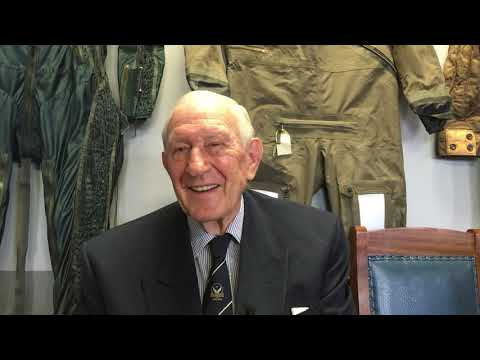
>> Hy Kim, are you going to have an interview with me about my time in Korea? Well it's so long ago, 1951. I was 20 years old, turned 21 there, and it was a great experience. We had just received our wings, qualified as pilots with few hours over qualifying, when they said it looked as though the Korean War would be over fairly soon, and we needed that experience. It didn't turn out that way. It all went on until 1953. So I was in 1951, it was a hectic year. It were very experienced pilots gone on the original squadron, and even with them and with us joining we had heavy losses. Almost 29 in the year 1951. Out of the total that we lost the war, 35. So in initial stages the anti aircraft was very bad. But I'm so pleased that I made it because it was an experience, a great experience.
>> What was your rank at the time?
>> I was a second lieutenant. Just shortly received my wings and we were commissioned when I was a second lieutenant.
>> And how old were you?
>> I was 20 years old then, turned 21 during my tour there.
>> How about the rest of the pilots?
>> Well as I said, you know, they were many of World War II pilots, they were just completing their tour already and were returning back to base and we then went as a replacement. And the powers to be thought it would be a great experience before the war would stop and it didn't, in fact, as I said it continued until '53.
>> Did you volunteer or were you ...?
>> Yes.
>> Why?
>> Well, you know what?
I was in Korea, decided on the Air Force as my career and my country had committed to helping the United Nations in the war so it was quite a natural thing. You volunteer and sign on the dotted line and off we went, you know? And looking back, I'm pleased about the great experience. The sad part about it having lost so many close friends. It was such a short period of time.
>> During the war you lost many friends?
>> Yes. Well as I said, you know, it was just in that one first year, 1951, those 29 pilots were lost. We lost a total of 35 so in the initial stages. The anti aircraft and so forth was really hectic, but as that sort of decreased, the losses diminished also. And towards the end, they didn't fly the Mustang anymore like I did. They flew the Saber, which is not as vulnerable, you know, as the Mustang was.
>> The Mustang is very, very famous. Why is it so famous?
>> It started as a great aircraft in World War II, and it was vulnerable in that it had a coolant system, wiping, running, you know, and being so easily damaged by anti aircraft fire. That was the only drawback about it, but it handled well. The endurance was very long. Compared to the Spitfire that I flew previously, which had a very limited flight endurance, the Mustang had a very long endurance. They were flights up to 7 hours, you know, with dropped tanks and so forth.
>> Do you remember a specific battle that was important to South Africa? So in South Africa, only Air Force?
>> Yes. Oh, no, that's wrong. The Air Force was the main contribution that we made on two [INAUDIBLE] squadron. Oversize squadron because replacements, you know, took quite a while because of the distance and so forth. They were only also Army contingents, officers, [Indistinct] to a British regiment. A contra member or fan, I taught 10 of them. Also shared in the war, on the ground forces with the British.
>> Well among other United Nations, there weren't too many Air Force, right?
>> Air Forces contributing, there was your UCEF and our Air Force, and then the British also had aircraft flying from carriers. The Australians had [INAUDIBLE], jet aircraft. Not that successful in the role that they had to do in ground attack after the [INAUDIBLE] in England, and it was a good aircraft but not quite suited for that war. Let's see, I can't think of the other aircraft, the other Air Forces.
>> Did you get to see any civilians? Korean civilians?
>> Out by [INAUDIBLE] down in the south of Korea, there was a naval base not far away and there was a very nice, in the sea, that we could go swimming. And we went there and I met quite a number of the young sailors, would meet us, you know, we were like foreigners and they were inquisitive and we had chats and what have you, and talking to, you know, people from the embassy, that the present attaché is from the Navy and he knows [INAUDIBLE] as well [INAUDIBLE]. So we had very enjoyable, in our off periods. We went [INAUDIBLE] in the south, was our main base but then we'd fly up to Seoul with a forward base and we did a lot of the operations we did from there.
>> And you visited Korea again?
>> Yes.
>> When?
>> Three visits.
>> Wow.
>> And my last visit was in June or was it July, and I was very, very pleasantly surprised to be decorated by a decorations and presidential decoration that the minister presented me with in July, it was, I believe.
>> Last year? July 2016?
>> Yes.
>> Wow.
>> So that was quite something.
>> Korea is very different from when you first went.
>> Whoa. You know, it's quite unbelievable. I tried to tell people what a country was ravaged, you know, with the enemy going through Seoul right down to the south and then being pushed back again, and to see that country now, how it's been rebuilt. It's just unbelievable just to see the road system and the building. It's so modern and very, very well organized and tidy. Very, very impressive. It's quite amazing that the industrial development is fantastic.
>> You must be very proud.
>> Oh, yes, and I'm pleased that I made that tiny, tiny little contribution.
>> It was not tiny, it was very big. It was very big. And when you were involved with the association, do you remember serving with some of the members of the association in Korea?
>> A member of?
>> The Korean War Veterans Association here in South Africa. Your comrades.
>> Yes.
>> Yes. Do you remember? Do you serve in the same unit?
>> Well we only had the one unit. Two squadrons.
>> Two squadrons. How many were in each squadron?
>> No we were only one squadron.
>> One squadron. How many?
>> Well pilots, more or less 20 at the time, pilots and they were replaced as they completed their tour and [INAUDIBLE] and so forth.
>> You must have been very close?
>> Oh, yes. Very, very close bond of the people who served in Korea, but there's so few left at the moment.
>> I know.
>> Like today, there are only two of us. My friend, [INAUDIBLE], was a prisoner of war, he would also have been here but he had another commitment and what have you. But I'm not sure off hand, but I don't know whether we have more than 10 or so pilots left, you know? A very good friend of mine passed away last week. [INAUDIBLE].
>> Did you say you were also captured?
>> Say again.
>> Were you also captured?
>> No, no, no. I was fortunate. I spent just over 4 hours on the ground, very far north of Pyongyang, near the Yalu River, but I was fortunate I was picked up by helicopter after about, just over 4 hours.
>> How did you get stranded on the ground? Why were you on the ground?
>> I had to bail out of my aircraft.
>> Why?
>> Because it wouldn't fly anymore it was, so I had to bail out by parachute.
>> Really? By yourself?
>> Yes, a single seat aircraft, you know, it's a fighter aircraft.
>> And who picked you up? South Africans?
>> No, no, no. A helicopter that was launched from an American ship, the Gunston Hall. This is Gunston Hall.
>> But how did they see you?
>> Well they were given the map reference and I could navigate there, and as it happened, it was very mountainous there and [INAUDIBLE] and I could hear this chuck, chuck, chuck, chuck, chuck come from an ACE51 Sikorsky approaching me and so forth. And I'll never forget that welcome site when he hovered, he didn't land he just hovered and they lowered a rope and they hoisted me up and the pilot turned around and shook my hand, and then we went out again and on the way out we were fired at again and was hit a few times. When we were escorted again by fighters going out, and I wasn't aware what the damage was on the aircraft, but on the first approach to land on the ship we had to go around again. He couldn't land because with the controls I think there was something wrong with the controls. And then on the second attempt we landed and so forth. And then I was taken to the sick bay and when I arrived there there was an American pilot from [INAUDIBLE] that had been shot down and he unfortunately lifted too late before he decided to bail out, and he was fairly badly burnt, you know, on his hands and his face and so forth. I had the advantage that one our pilots had also lifted a bit late so we all knew if the temperature started going off the clock, it was time for you to make sure that you got out in time before it burst into flames.
>> The helicopter that picked you up, was it United Air Force or Navy pilots?
>> Naval pilot, yes.
>> Wow.
>> USS Gunston Hall. Later on somebody visited America and per chance, one of our newspapers met the captain of the ship who was at the time, and I've got some newspaper cuttings and so forth, you know, and he also explained, repeated the story again and what have you. That's quite a small world.
>> So he was a Naval pilot who picked you up?
>> Yes, yes.
>> And you got to meet him again?
>> No, no, unfortunately not.
>> You later learned about him?
>> Yes. The newspaper man from South Africa visited America and by chance met that captain of the ship. It was a captain of the USS Gunston Hall at the time.
>> What was it called? USS?
>> Duston Hall was the name of the ship.
>> Dunston Hall, and the Navy pilot was from that ship. USS Gunston Hall.
>> Yeah.
>> Wow. You know it would be so fascinating for you to have a reunion with some of the people because I interview many veterans, and they talk about each other, you know, like British talk about Australian. British talk about, you know, Americans. So it would be nice to do a reunion. Did you have any Australians? Did you see any Australians?
>> Once there were some Australian pilots who visited us and we had quite a party and so forth but they were, you know, at another base quite a distance. But we were three American squadrons with our squadron, formed the 18 Fighter Bomber [INAUDIBLE]. And we had very, very good relationship with the three American squadrons. Very, very good experience.
>> What did you do for rest when you didn't have missions?
>> Well the main thing was swimming, as I mentioned, you know. Near that naval base. I think that was, fortunately, I was there only in summer. If you talk to people who were there in winter, that's another story.
>> I think you were fortunate.
>> Very fortunate.
>> Yes.
>> So time off ...
>> How long was your service? How many months?
>> I was only there for over 5 months, and I've completed the ...
>> In 1951?
>>... the normal tour we had to do was 75 missions, but I went down on my 73rd one and when I got back, you know, the helicopter picked me up and then I went, was taken by small ship to a island, Ryodo Island, off the Wonsan harbor and then with a very icy sort of a trip in the [INAUDIBLE] aircraft, went back to my base and so forth. And when I walked into the office, because we had lost so many of our young, of course, already, as I walked in he said, "Mike, pack your bags, you're going home." So I still had two, three missions to go, but he said, "You've had enough." Because there were so many of our course, you know, who had been shot down.
>> So on average, how many missions did you fly per day?
>> The most, possibly four. On average, it's difficult to say actually, because as I said, we'd fly missions and then you'd have a day or so off and then you fly missions again. By far the most I think we ever did was four, because it was mostly long missions, you know? Two hours, three, four hours. So it varied a lot depending on what type of mission it was and so forth.
>> And you would look for the enemies?
>> Well our main, our task was ground attack. We mainly looked for vehicles bringing down ammunition and supplies and what have you.
>> And you would shoot them?
>> And then we would [INAUDIBLE] them out. And I became so clever and so good at camouflage, eventually they didn't travel by day at all. They'd only travel by night. And during the day they would hide their vehicles so well it was quite something. But it's quite amazing, actually, one of my early missions I flew with one of the experienced pilots, [INAUDIBLE] officer from World War II, who was a ground attack pilot. And I could then learn from him and we all learned from him. We were a number of [INAUDIBLE] young pilot. We flew out to another target and he spotted some vehicles, and he made his first attack and fired and then when the first vehicle burst into flames, we could also then make out the other vehicles but I'm sure if we'd flown past there, we would never have seen the vehicles. So it was his experience that helped up and so we also became quite experienced.
>> There were solo missions.
>> Say again.
>> Solo missions, or did you fly alongside?
>> No, flight of four.
>> Four.
>> We're normally a flight of four and then we did the big [INAUDIBLE] we did on Pyongyang, we had 64. We had the biggest with 64 aircraft.
>> Sixty four aircraft? Not all South African though?
>> Oh, no, no, no, no. The three American squadrons and our squadron, so we make up a quarter of the squadron.
>> And how many losses did you suffer from that one, out of the 64?
>> On that one we lost the one pilot. It was quite a sad loss because at the time he was a South African high jumping champion, you know.
>> What's a high jumping champion?
>> Pardon.
>> Can you explain to me about the jumper? You said lost his ...
>> An athletic high jumping when you have two poles and a crossbar.
>> And he was a champion?
>> At that stage he started with an American roll, I think it was called, [INAUDIBLE] quite a lot now [INAUDIBLE] they sort of go over on their back to cross the crossbar, but his record stood for several years after that. South African high jumping record.
>> Did he [INAUDIBLE]?
>> That was a sad loss. He would have made a very good rugby player. He was a great rugby player, also. Twenty years old.
>> He got shot down? His plane got shot down?
>> Say again.
>> His plane got shot down? His plane?
>> Yes, yes, yes. He called up, he said, "I've been hit. I'm heading for the coast but I don't think I'll make it," and then he was cut off. I think the aircraft possibly burst into flames or so.
>> Do you know when that happened? When the pilot's aircraft is down and his body is burned, then how do you retrieve the remains?
>> Oh, no. There are very few remains. We lost quite a percentage of our pilots, which never recovered because [INAUDIBLE] it's on the other side of the bomb line.
>> Not even the dog tags?
>> No. Very, very few were recovered if they were near the bomb line, you know. The diving line between enemy forces and our own forces. No, I can't quote you the numbers now. I know of a person, I got close friends with him, he was a captain and a very experienced pilot from World War II. I think later on the area where he went down, had been recovered and was in our own friendly territory. They traced the remains, and he was buried in the memorial cemetery down in Pusan.
>> I will be going there.
>> Is it?
>> Yes.
>> Well there you will see, I can't remember off hand now, possibly seven or so of the graves. And the other people who were not recovered because they were too far into enemy territory.
>> I'm going to the memorial today.
>> Say again.
>> I'm going to the memorial today, and I will pay my respects.
>> Oh, I appreciate that.
>> Thank you so much.
>> My pleasure.
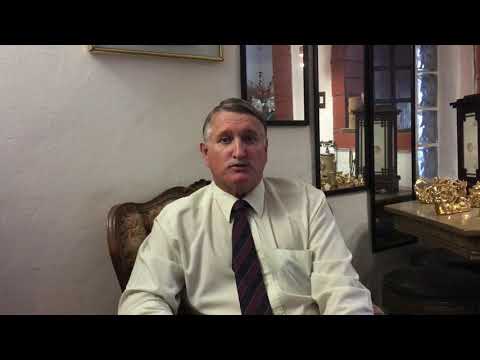
>> My name is Dirk Louw, and I am the president of the South African Korean War Veterans Association in South Africa. I have been serving for the past 4 years after being elected as a descendant to serve as the president of this association in South Africa. The South African contribution started in Korea on the 4th of August, 1950, when the South African government decided to answer the call for support for the United Nations effort in Korea, and a total of 826 South African airmen and ground crew served in Korea over this period until 1953. The first forces left by ship on the 5th of September, 1950, and over this period, a total of 36 members paid the highest price. Two of the members were ground crew, and the 34 was pilots, and then a 37th member died 8 months after returning to South Africa, due to the horrendous conditions he had to be in during his days in a prisoner of war camp. Over this period, the South African Air Force has leased aircraft from the United States, and 74 Mustang aircrafts was written off over this period, as well as five Sabres. The South African contribution over this period was highly ... Okay, I'm going to start this portion, just this portion. Over the period of 1950 until 1953, the South African forces lost 34 pilots and two ground crew, and they lost 74 of the 94 Mustang aircraft leased to the South African Air Force and five of the 24 Sabres that was leased. The South African Air Force contribution was seen as a major contribution towards the war, and the majority of the pilots were highly decorated for their efforts. Currently, I am serving as the president mainly to ensure that I look after the welfare of the members of the Korean War Veterans Association and then also to ensure that I document all the information related to the heroic deeds that these men did during the war. I have a monthly newsletter which I then produce and which I distribute to various countries, where people are that are interested in reading this newsletter. We have several functions during the year, which are related to the Korean War, but we also attend several other memorial services in South Africa, where veterans are generally remembered. In South Africa, we have three full memorial sites where the Korean names appear. One is at Air Force Base SWAT group at the memorial. The other one is at Union buildings, and the third one is in Capetown. I don't know what to say more.
>> No, that's perfect. Oh, how many are there now and ...
>> Okay.
>> ... active?
>> The current situation is that the members are getting old, and at this moment, according to my documentary proof that I have on the registry of people that have belonged to the Korean War Veterans Association, and we must please understand that there are a lot of members that never belonged to the association, but the members that are registered with me are, at this moment, 21 Korean War veterans, which consists of ground crew, as well as pilots, and then we have 19 wives, as well as 35 widows. The memorial services that are held are normally attended by myself and then one of our senior Korean War veterans, General Herb and his wife, and the Korean-specific memorials, like the Armistice Day in June, is normally attended by the majority of the veterans, as well as the majority of the descendants. So we have a huge contribution by the members on that occasion. We have several small functions during a year. We try to see where we can accommodate the needs of the members, and then as well as where there are a lot of the ... See, I can't say a lot of.
>> It's okay.
>> Okay, I can start over at this portion again. They are several small events during a year where there are associations in South Africa, like, for instance, the International Youth Foundation, which normally wants to do some dances for the veterans and entertainment, and the South African volunteers went to Korea, and they went to a country they never have heard of before, and they set foot in a country where they have never been before, and they have defended people that they've never met before. I'm proud to say today that I am very honored to be part of this association, and like one of the senior veterans said on the question why he really fought in the war, [INAUDIBLE] said that as everybody has a quest, it was their quest to help those that couldn't help themselves.
